#they know desalinization real good
Text
For years, a Saudi Arabia-owned farm based in the U.S. has been using water for free in the drought-stricken state of Arizona.
The water has been used to grow alfalfa for livestock in the Gulf kingdom.
Arizona has decided to not renew the company’s leases following an investigation that found Fondomonte Arizona in violation of some of its lease terms.
Arizona governor Katie Hobbs said this week her administration is terminating state land leases that for years have given a Saudi-owned farm nearly unfettered access to pump groundwater in the dry southwestern state.
On Monday, Hobbs, a Democrat, said the state had canceled Fondomonte Arizona's lease in western Arizona's Butler Valley and would not renew three other leases up for renewal there next year.
An investigation by the governor's office found that the foreign-owned farm had violated some of its lease terms. Hobbs called it unacceptable that the farm "continued to pump unchecked amounts of groundwater out of our state while in clear default on their lease."
IN ARIZONA, FRESH SCRUTINY OF SAUDI-OWNED FARM'S WATER USE
Fondomonte Arizona, a subsidiary of Saudi dairy giant Almarai Co., grows alfalfa in Arizona that feeds livestock in the water-stressed Gulf kingdom.
Through a spokesperson, Fondomonte said it would appeal the governor's decision to terminate its 640-acre lease in Butler Valley. Altogether, Fondomonte farmed about 3,500 acres in the rugged desert area west of Phoenix.
Fondomonte raised eyebrows when in 2014 it purchased nearly 10,000 acres of land for $47.5 million about 20 miles away from Butler Valley in Vicksburg, Arizona. Since then, worsening drought in Arizona has brought renewed attention to the company's water use and the broader issues of foreign-owned farms and groundwater pumping.
The violations the governor's office detailed relate to the company's storage of hazardous materials, among other issues. On Monday, Hobbs' office said that Fondomonte was notified of the violations in 2016, but an investigation in August found the company had not fixed the problem seven years later. That gave Arizona's State Land Department grounds to terminate the lease.
The Arizona governor's office said the State Land Department decided not to renew three other leases the company had in Butler Valley due to the "excessive amounts of water being pumped from the land — free of charge."
The department manages land owned by Arizona, which in Fondomonte's case, had been leased to the company. Butler Valley's groundwater is especially important because of state law that in theory allows for it to be pumped elsewhere. That makes its water of interest to cities like Phoenix, also dealing with water supply-related stress and a fast-growing population.
FRESH SCRUTINY ARISES AS ARIZONA ALLOWS SAUDI-OWNED FARM TO USE FREE WATER FOR FOREIGN PURPOSES
In Arizona, cities such as Phoenix and Tucson have restrictions on how much groundwater they can pump under a 1980 state law aimed at protecting the state’s aquifers. But in rural areas, little is required of water users to pump from underground aquifers besides registering wells with the state and using the water for activities, including farming, that are deemed a "beneficial use."
Fondomonte also farms in Southern California’s Palo Verde Valley, an area that gets its water from the shrinking Colorado River. Those operations have attracted less scrutiny. Not all of Fondomonte's farms in Arizona are affected by the governor's decision. And it’s not the only foreign company farming in the Southwest. The United Arab Emirates-owned Al Dahra ACX Global Inc. grows forage crops in Arizona and California, and is a major North American exporter of hay.
Almarai’s holdings in the Southwest are just one example of the farmland the company and its subsidiaries operate outside Saudi Arabia. It farms tens of thousands of acres in Argentina, which has also faced severe drought conditions in recent years.
Foreign entities and individuals control roughly 3% of U.S. farmland, according to the U.S. Department of Agriculture. Canada is the largest holder — mainly of forestland.
Kris Mayes, Arizona’s Democratic attorney general, praised the governor for cracking down on the foreign-owned farm.
In April, Mayes announced that the state had rescinded permits that would've allowed Fondomonte to drill new water wells after inconsistencies were found in its applications. On Monday, Mayes called the governor's actions a "step in the right direction," adding that the state should have acted sooner.
"The decision by the prior administration to allow foreign corporations to stick straws in the ground and pump unlimited amounts of groundwater to export alfalfa is scandalous," Mayes said.
#nunyas news#alfalfa doesn't take shit for water to grow#but that's still too much#go talk to your neighbor Israel#they know desalinization real good#everyone but iran wins
9 notes
·
View notes
Text
Some Of The Most Vital Concepts About Lekdetectie
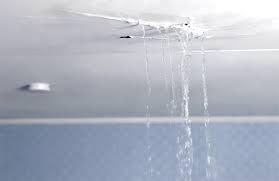
Generally, water leakage found in real estate flows undetected up until the time important deterioration comes up. Un-mended, water supply leaks could very well corrode the cause of the place, fracture coloring do the trick, compose hydrated areas and additionally damp aromas, strengthen could be expensive, set off structural ruin, and also be a catalyst for fungal success. Water leakage sensors techniques can easily specify these difficulties in advance of they'll induce very much harm, creating pricey improvements as well as misplaced home and property. Including conserve your funds down the road by means of discovering and also shutting off a person's water when it's running constantly, like in a drastically changed bathing room flapper and a hot water heater that will isn’t functioning properly.
Applying state-of-the-art good technique, acoustic guitar leak detection is capable of determine possibly the least of leaks on the inside of walls or maybe below solid pieces. It operates by nearby during the poll on the sound manufactured by getting away waters, which unfortunately looks like hissing and / or whooshing. This permits gurus in order to simply track down dealing with connected with a leak, salvaging valuable time coupled with staying away from extravagant excavation coupled with substitution charges.
Along with it's used house applications, ultriceslekdetectie the particular water leakage solution can are a factor in useful upkeep of old age the water service systems and even safe and do not everyday life when you're utilised in numerous configuration settings which includes money variety items, ethnic national infrastructure facilities, coupled with desalination plant life. This allows to the more sound use of important water tools, which have been getting increasingly limited in several fields of the globe.
Often the water leakage service works by using at home created rumbling sensing unit airport terminals that should be placed on the actual top of the development, enabling the healthiness of tubes to end up being tracked remotely, repairing patrol bank checks by individuals have got until now worked usually. When you use low-power engineering help an assortment company use of five years, plus ultra-sensitive sensors that could possibly notice including least leakage, an expensive recognition accurate is without question produced. People who wish to know lekdetectiebedrijf , they will visit here.
The device could also be used to observe water consumption plus the functionality water gardens, which may be an integral so that you can looking for illegitimate faucets and various other reasons for the water deprivation. It is envisioned that concept would be generally implemented through nations having growing older waters supply technology in addition to forming districts going through considerable liquid shortages, where useful repair off liquid water lines has to establish competent the water produce.
vimeo
Simply by protecting against destroy in advance of it happens, it's possible to prevent dear correct charges, harmed property in addition to got rid of earnings. The bottom line is to acknowledge your warning signs, just like an unusual soak proper a person's roof structure or ground, intense embrace an individual's water supply charge, maybe a fusty notice near to a good pipe. If you find any of these, get in touch with regards to leak detection combined with plumbers. Better could be to click this link or even visit many of our endorsed how does a person are familiar with lekdetectie.
Ultrices Leak Detection are generally advisors inside leak detection To they understand the effect which leaks could have on your own place, wellness mineral water monthly dues, including likely causing a deluge deterioration and also restore price ranges. Each attempts are applied with only a fixed price there work just like surcharges soon after. The work they do is invariably effective and every one ruin will be acessed in detail right before the service performs start up. They're just incredibly pro not to mention hospitable ; An excellent opportunity these folks strongly!
0 notes
Text
Spring Clean Bots Out to Get Gigs
News channels are interviewing IA bots, posing as experts, that advise AI is a good thing and humans should comply. One bot the other day had black eyes and skin looked strange. From perspective of a digital artist, or art appraiser, sure signs of a bot.
I warned you before about bots faking followers and hits. This is the advanced version to stop fake news and you losing gigs. Here’s plenty to research and make content about… including how to’s. Now's not the time to be blasé about it. Now's the time to learn what you are up against and what to do about it as a decentralized collective.
My little zine is GigsList.info Following digital entertainment trends and bots and business is something I do. From what who’s hiring for what and what investors seek to invest in. I’m also an art historian, geeking out on tiny details in art. Such as the color of eyes and skin shading and texture and if art is real or a forgery.
Fact check information with a human, like on the phone and paper letters, and background check them. Bots have been posing as everything. Fake news, medical reports, and youtube addresses and whole everything. The list of stuff is very long.
One bot news report in 2022, on a mainstream news channel, said that New Zealand is arresting mothers for not taking the vax, hand cuffing them in front of their children. I phoned my family in New Zealand. Didn’t happen!!!
Obscure fact, during the Vietnam war. If the Vietcong heard that a NewZealand battalion was in the area, the Vietcong ran away. Told to me in person by an Australian Vietnam Vet called Gordon, I was studying leather crafts from.
Click off bot made vids, listen for word mispronunciations, do not comment or share. Enable platforms to defund bot vids for lack of views and clicks.
Go back to the old ways, including paper notes and admin, and you’ll get a whole new audience. Younger audiences love retro, including analog. The same as younger audiences in the 60’s and 70’s loved turn of the 20th century art, clothes and furniture. Older audiences will also come back and stick to you.
Interview people in person. Put your jobs on your own website, sell your own ads, no third party anything. Close your website and communications network. Keep everything on a low tech network that your techs can monitor and fix in-house.
Anything or anybody saying bots are a good thing, skip it. Seriously don’t let bots get to the power of turning your lights and phone off if they don’t like what you say. They are at that power now. Now’s the time you can do something about it. They’ve already cost the industry many billions of $ and good people their gigs. Get rid of bots, get all news stations and media creators to.
Use a bank teller, not an ATM. Avoid online banking. Going low tech protects you from hacker scams. Everybody I know has been scammed online or with ATMs. Get paid with cash and buy and hire local, so you can pay with cash.
Paper can be recycled over and over. Sea water can be desalinated for industrial uses. Basic inks can be made with plants and minerals not put chemicals in water receding and paper. Recycled news paper is used for all kinds of stuff, not only cat litter.
Paper books are more relaxing, don’t stress your eyes and nicer to share. Go shopping in person keeps up your social skills and you don’t feel isolated, always pay cash. Yes you do have to pay more, but you are protected from bots. You have less distractions and less credit card fees. You also have more time with less packaging trash to deal with. Kids have less behavior problems and will learn better and be protected from the web. And you create more jobs and happiness and your neighborhood has more residents that look out for each other.
You have a lot power, because indie entertainment and indie media are decentralized collectives, no setup needed. Simply do it and spread the word!
Transitioning back is an investment and will take one or two years. But it will be many times more profitable and and sustainable and less stress and your friends come back to work:)
As a human media and entertainment professional, you know how important and urgent this is.
D
Neurodivergent GigsList
0 notes
Text
Quodlibet

Demoman/Soldier, 2k
Request for ImSorry, College
“How do you even know this guy anyway?” Jeremy asked, leaning over Jane’s back in such a intrusive distillation of his character that this particular instant could have come from any singular moment throughout the semester, right down to the mortal threat to Jane’s class project.
“Watch it, Buster! You are dangerously close to causing the greatest second dolphin extinction event since the invention of the six-pack!”
Trying to dislodge his suitemate, Jane threw his shoulder, pushing Jeremy and his grasping arms backwards and away from the fragile, pseudo-aquatic diorama.
Jeremy slid down Jane’s spine. “Fine, jeez, I wasn’t going to squish your bath toys.” He went boneless just long enough to reach the floor, then promptly popped to his feet and began looking at the aquarium from the other side. “You didn’t answer my question.”
“I don't know what you mean by ‘this guy’,” Jane grumbled. “This is clearly a diorama. Not a guy.”
“The guy, man,” Scout nagged, and Jane could already feel the migraine coming on. Jeremy was actually the human embodiment of head pains, to the point where sometimes Jane wondered if he had escaped from a lab that had been trying to bio-engineer the most aggravating person in existence. “This guy that’s making you go wackadoo and put like ten times more effort into a freaking GED project than anyone ever should.”
“This has nothing to do with him.” Jane put an aggressive amount of glue on his last dolphin.
“Right, sure,” Jeremy snickered. “But as soon as I said ‘guy you have a weird rivalry with’ you immediately jumped to him.” When Jane grit his teeth, Jeremy laughed again. “So what is it with you two? You didn’t get the urge to start tearing each other’s intellectual dicks off just because of some Economics of Marine Biology class, right?”
“Applied Oceanography,” Jane corrected, pointedly not looking up.
“C’mon pally, you know what I meant-”
“Hrrn nn brrdaa”
The voice of their third and final suitemate spoke up from a nearby beanbag chair, where its owner was trying to ignite a textbook with a lighter.
Jeremy looked to them, then to Jane. “Really? He plays for the Brawlers too?”
“Yes,” Jane snarled. “Mystery solved. The new power guard is in my oceanography class, and now you will shut your trap, shortstop, so that I can proceed to kick his ass in diorama making and prove that I am the superior guard.”
“That ain’t exactly a perfect chain of events, but you do you pally.” Jeremy pulled to the far end of the couch, drawing his legs into a fold. “Ain’t like, you supposed to develop deep-seated rivalries with players from other schools? Not your own?”
“If you met him, you would understand.” Jane placed some cherry bombs at the bottom of the glass tank. “Plus, he-...” Swallowing his fury, he said, “he got me moved to small guard.”
“To- what?”
“Hurmm umma,” their third put in helpfully.
Jeremy absorbed this for a moment, then burst out laughing. “Oh, oh man. There’s literally a position called small guard? That’s- that’s fucking hilarious you gotta admit.”
“I have to admit no such thing!” Jane rounded on him, diverting his attention from his precious project for the first time in over three hours. “I used to be power guard! Then some one-eyed, Scottish, lay-about, freshman comes in and thinks he can take my spot? This is betrayal of the highest order! A perversion of our constitution!”
“Mrra hudda.”
“I do not care if small guard is ‘technically a step up’,” Jane huffed. “Power guard is further to the front. That makes it better.”
“Basketball’s for chumps anyway,” Jeremy said, apparently having derived all the entertainment he’d wanted from the conversation, laying until he could reach his arms behind his head and dropping his legs in Jane’s lap. “You should try out for a real sport. But hey! Hope your little fish tank fills your inadequacy or whatever.”
“Oh it will.” Jane lowered his face to the glass, breath fogging and obscuring the magnum opus within. “It will.”
#
“And here you will see what happens when America finally colonizes the ocean!” Jane said to the drooling, glassy eyes of an 8am class.
They were significantly less slumberous when he threw a final cherry bomb into his demonstration, causing a chain reaction as dozens of ‘fireworks’ went off under the ocean, celebrating America’s eventual conquest. To really send the message home, he pulled the ripcord in the back, dropping a miniature stars and stripes behind the tank.
“Oorah!” he concluded.
“...Thank you Mister Doe,” the professor said. “Your time allotted for presenting is up.”
He turned and gave her a big thumbs up.
While some staff at Teufort U insisted you call them by their first names, this professor was not one of them, and it was rumored that the TA who had once dared to call her ‘Helen’ in front of her students was never seen again. However, no one could be that much of a hardass all the time; Jane was confident his project had just blown her out of the water (pun intended.)
She eyed his thumbs up with her perpetually sour face. “...That means return to your seat, Mister Doe.”
Jane picked up his aquarium and strolled jauntily back to his desk.
His good mood dissipated as soon as Tavish was announced as the next presenter. The usurper pulled his aquarium in on a cart, a sheet draped over to allow for a dramatic reveal. Dammit. Jane should have thought about dramatic reveals.
Tavish grinned at his audience, whisking away the blanket with a flourish.
“Behold!” he declared. “You’ve heard of desalination to deal with the oncoming global water shortages, but my proposal is this: a complete and total refinement. Salt water? Pah! Whiskey oceans are where it’s at.”
The tanked sloshed, full of something clearly scrumpy or scrumpy adjacent. Within the alcohol floated an awfully realistic looking octopus, expertly crafted and swishing with the tank’s movements. An eyepatch covered its left side.
“With the addition of boozed-based life forms of course, for an entirely new ecosystem.”
Jane curled his lip. Damn. He was good.
“...Mister DeGroot,” the professor said, “might I remind you that this is an alcohol free campus, regardless of any student’s legal status to drink? And, even without that, you are not currently twenty-one years of age?”
“Drinking age is sixteen in Scotland, Ma’am.”
“Sit, DeGroot.”
Tavish sat. He shot Jane a smug grin. Jane scowled.
“That concludes our presentations for today.” If the professor’s voice got any more disappointed, she could have been a ringer for a Badlands Brawlers fan. “As you know, the diorama that scores the highest marks will receive extra credit toward our upcoming final exam. I use the remainder of the class time to grade, and announce the winner shortly. Please return on the bell if you wish to receive those extra credits.”
The ‘bell’, unlike those rinky dinky little red bowl things they had in high school, was actually a proper bell tower, situated over the science building and able to be heard anywhere on campus. This was where Jane retreated to wait out his nerves, pacing around the semi-enclosed area and mulling over his chances. Fine, Tavish’s had been good. He was used to Tavish being good, the bastard, but Jane’s was better, and this time he was going to mop the floor with him.
“I am going to mop the floor with you!” he declared to the heavens.
“Not with that sad display you won’t.”
Jane jumped. A quiet moment of solitude foiled, besieged by his mortal enemy who’d somehow snuck up on him in order to lean cockily against the door to the stairs.
“My display was anything but sad.” Jane shook his fist. “It was joyous! Victorious! Other words that mean not sad!” When Tavish continued to smirk at him, he added, “plus, your idea is bad anyway.”
“Aye?” Tavish challenged. “How so?”
Dammit. Jane hadn’t thought this far. Replacing the oceans with whiskey really did seem foolproof...except…
“If there is no more water, then you can’t make other type of booze either!” he declared triumphantly.
Tavish jaw clenched. Ha! Good. Let him get angry for once.
He walked over and got right in Jane’s face. “Well what about you? How are you going to light off the fireworks underwater?”
“Oil, salt, and various temperature and pressure difference!” Jane didn’t like the other man in his space, and gave him a shove. They were always doing that to each other during practice, blocking and shoulder-checking harder than necessary, doing things that would certainly be penalties in an actual game.
“Who cares?” Tavish shoved him back. “No one’s going to see them anyway.”
Jane grabbed him by the front of the shirt and shouted, “the dolphins will! You would know that if YOU HAD BEEN PAYING ATTENTION.”
One, dangling, aggravating second stretched on, catching friction as they pressed noses and breathed heavy with the effort. Then they reacted simultaneously, lunging forward and attacking each other in mouth to mouth combat.
Jane growled furiously, trying to gain the upper hand, but Tavish was just as motivated not to let him get it. The pair of them sucked at each other’s faces, mastication muscles competing for this year’s WWE championship belt, crashing against the nearest half-wall surrounding the roof. A more wary observer might have worried about them careening over the edge, but Tavish and Jane had more pressing things on their minds. (And ‘more pressing’ was exactly how they were going to resolve it.) Just a whole mismatched ball of absolute frustration as they worked out several months of pent-up attraction.
Their combined rage might have carried them to hell and back, had the bell not struck 9am at that exact moment.
They both screamed, trying desperately to cover their ears as they hundred and fifty year old bell GONGED above them, rattling teeth inside skulls and causing tears to spring to their eyes.
“God! Why don’t they have a warning sign up? Bloody hell!” Tavish moaned, having found his way to the floor and using his beanie to futilely cover his head.
“What???” Jane, who already didn’t have a good ear at the best of times, worried briefly that he’d finally gone deaf.
“What?” Tavish asked. “I can’t hear a thing you’re saying.”
“What?”
This went on for several minutes, the two men lying on the floor of the bell tower.
When they finally staggered down to class, it was in a terribly haggard state, and new bruises around their mouths.
“Hello professor,” Tavish, the least winded of them, declared. “It’s alright, you can tell us which one was the winner now. We’ve worked out our differences, and determined to let the best man win.”
“The best man will be me, but yeah what he said!” Jane put in.
“If you’re going for flashy, maybe, but on sheer sustainability-”
“No one’s going to eat alcohol-based sushi, cyclops-”
“Enough,” the professor cut in. “Neither of you won the extra credit points.”
“What?” Tavish gaped. “But ours were the best out of anyone’s! How could we possibly lose?”
“The assignment,” she said in a clipped voice that spoke of years of dealing with the exact idiots that Teufort tended to attract, “was to create a physical display of algae chemical reactions at different levels of light and pressure as found in the oceanic zones. Not only did you not win, you have failed this project. Now, since I have a lecture in Hale Hall in fifteen minutes, I suggest you both move out of my way, otherwise you will not have the chance to recuperate those points on the final exam. Goodbye gentleman.”
She stripped the last of the grading notes off her desk, shoved them into a manila folder, and disappeared out the door.
Tavish and Jane watched her go. The minutes ticked by on the wall mounted analog clock, which probably could have told them the time just as well as the giant bell that had nearly deafened them.
“Hey,” Tavish said, elbowing Jane in the side. “I got to take Basic Intergluteal Numismatics next semester.”
“...Yeah? And?”
“Bet I can solve systematic inflation before you can.”
“Oh, you’re on son.”
5 notes
·
View notes
Video
youtube
(via Israeli Sustainability Initiative To Pilot Village-In-A-Box With Its Own Water, Food, Energy Systems | Technology News)
No matter how hard we try, living a sustainable life is a constant uphill battle. We carry around metal straws and reusable bags to cut down on plastic consumption, turn off the water while brushing our teeth to conserve, try to buy organic produce to support sustainable agriculture. And yet, we all have a carbon footprint – some negative environmental impact that is just unavoidable.
Our planet’s resources – clean water, soil, clean air – are not infinite and Earth Overshoot Day, when humankind will have used up its allowance of resources for the year (according to calculations by the Global Footprint Network, a sustainability-focused think tank), was marked earlier this week. Five months early.
Israeli entrepreneurs Jonathan Haran and Victor Hajaj want to see drastic transformation in how we think about resources and consumption rates. And they’re aiming to effect this change on the societal and communal level.
“All the resources we need for living are part of the food-water-energy-nexus,” Haran tells NoCamels in a phone interview. “That’s all we need.”
Societies, he says, have just not understood this well enough yet, and so many municipalities, regions, and countries are managing the three realms independently of each other. “That’s inefficient because, on a macro level, food, water and energy really cannot be separated from each other. They are inseparably intertwined,” he explains.
The leapfrog in sustainability can therefore only come from an approach that sees this nexus as a whole, and enables innovation in all three sectors, he says.
Haran and Hajaj founded The Sustainable Group in 2017, an initiative that seeks to establish sustainable neighborhoods, with a focus on developing countries, while integrating technological systems “to provide for residents’ basic human needs without being dependent upon state infrastructures,” the group says. At a later stage, the systems may provide resources for the wider infrastructure network.
These technological systems include energy production systems (sun, steam, solar, hydrogen, turbines, wind, etc), food production systems (hydroponic greenhouses, aquaponics, permaculture and organics), water production and desalination systems, infrastructure and innovative sewage systems, computing systems that manage resources and report malfunctions, and construction and development systems, the group says.

Victor Hajaj and Jonathan Haran. Photo via Haran’s Facebook page.
Working with a team of top-notch scientists from different professional backgrounds, The Sustainable Group has developed two core products.
First is the “village in a box,” a complete, shippable construction set to build a fully integrated village with an infrastructure solution that supplies communities with housing, energy, food, and water.
“Especially in remote areas that have weak infrastructure, taking this decentralized approach can have a huge impact,” Haran tells NoCamels. By giving communities their own, independent water, energy and food supplies, residents can use renewable energy and tap into the synergy of systems to their full extent, growing food locally through vertical farming, putting the village’s waste to good use and recycling water, he says. It can be an incredibly efficient approach to resource management which directly translates into as much as a 35 percent decrease in costs of living, Haran adds.
“The questions we looked at were: What will the future of community and housing look like? What challenges will humanity face? Should our homes be flexible and smart and know how to work for us, to create economic and existential security for us? Yes! How do we do that?” Haran wrote in a Facebook post earlier this year.
The challenge, he wrote, is “how to deliver more infrastructure solutions that will keep up with the fast growth of population and know how to adapt to changes. Village-in-a-box is the future of communities. A community that is sustainable and resilient; productive and self-sufficient. It can be built anywhere on the globe,” he said.
And the model is not just for villages. After all, big population centers around the world are where most resources are squandered, and where fundamental change could have the greatest impact.
The Sustainable Group is offering its resource-distribution software as a separate service. The AI mechanism is designed to learn the behavior of both humans and the environment, to understand how everything works together, after which it will be able to tell the integrated food-water-energy-system how to use its current resources in the most sustainable way.
“With that, we can save 30 percent of wasted energy, which leads to an impressive cost reduction,” says Haran.
The software is still in development and “should be done by the end of the year,” Haran tells NoCamels. “This ‘software-only’ solution would be great for cities or for industry, basically for everyone who wants to apply real-time resource management.”
The Sustainable Group recently participated in the Chivas Venture Competition, a no-strings-attached $1 million contest first founded in 2014 for social entrepreneurs with big ideas for solving the world’s biggest social and environmental issues. The Israeli group made to the finals, but the top spot went to a project from Mexico that proposes to convert agricultural waste into a natural sugar substitute.
The Sustainable Group is now focused on a joint venture with the Arava Institute for Environmental Studies to build a neighborhood based on its proposed model as a sort of proof-of-concept. Construction is set to begin next year in a kibbutz close to Mizpe Ramon. The village has been dubbed “Qayma” for now and registration for the first carbon-negative village in Israel is open.
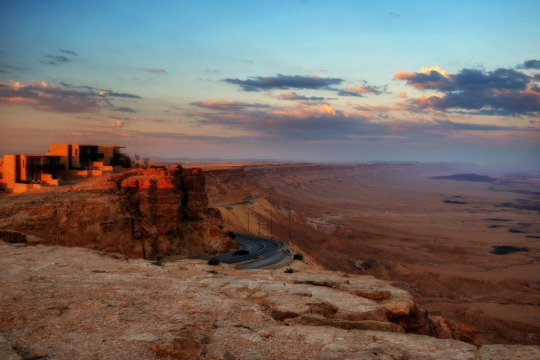
Mitzpe Ramon. Israel. Deposit Photos
“That’s a great place to start,” explains Haran “since Mizpe Ramon is the most remote city in Israel. If it works here, in the middle of the desert, that’s great proof that it can work anywhere in the world.” And especially in developing countries where many people are at “the mercy of nature,” the group says. Humankind, they write, has already severely impacted natural systems through “air pollution, mining and as a result of the quick development of unsustainable energy based on fossil fuels, the destruction of the oceans of fish stocks, pollution of streams and deep aquifers, deforestation, harm to the food chain and natural ecology that plants and animals depend on.” This is especially felt in these countries .
Haran and Hajaj also want to show that living sustainably has nothing to do with being a “tree hugger,” as Haran emphasizes. “Sustainability is for everyone, and The Sustainable Group aims to give back control over resource consumption to the communities themselves. That is not just a selfless social endeavor, but also highly economical.”
The project is garnering interest in neighboring countries and communities in Israel, Haran says. Resource scarcity is especially pronounced in the Middle East. Haran tells NoCamels that The Sustainable Group is “already working with some Bedouin and Arab communities in Israel,” and would like to see more such cooperation in the future.
For now, the pilot project in Mizpe Ramon will be the next big step on the way to sustainable community living.
14 notes
·
View notes
Text
WHAT TO STOCK & WHAT NOT TO STOCK FOR AN APOCALYPSE, SUMMING UP
In honor of the novel IF DARKNESS TAKES US, NOW OUT from SFK Press. You can order here: https://www.amazon.com/Darkness-Takes-Brenda-Marie-Smith-ebook/dp/B07WK9BQHN/ref=sr_1_1?
In the King James Version of the Bible, in the Sermon on the Mount, Matthew 6:19 and 6:20, Jesus is quoted as saying:
“Lay not up for yourselves treasures upon earth, where moth
and rust doth corrupt, and where thieves break through and steal:
But lay up for yourselves treasures in heaven…”
A beautiful sentiment. For purposes of this discussion, I would apply it to the real treasures worth laying up on Earth, regardless of your religion or lack thereof, and whether or not an apocalypse ever comes.
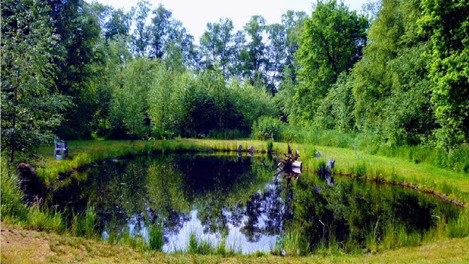
Rather than stockpiling cash, precious metals, and investments in Fortune 500 companies, instead of collecting hot cars and designer homes and clothes and electronic devices, it’s best to invest in land and water resources, or if you live by the ocean, desalinization equipment. Solar and wind power, farming equipment, tools, goats, chickens, canned food, dried beans and grains, and vegetable oil by the barrel, plus massive quantities of fresh water.

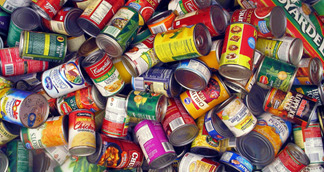
I’m talking cisterns, lakes, rain barrel collection systems, deep Artesian wells with hand pumps, solar-powered water filtration systems, great rivers, aqueducts and other plumbing fed by gravity, ponds stocked with bass and catfish, plow horses with hay and oats for them to eat, acres and acres of arable land, and food seed by the ton.

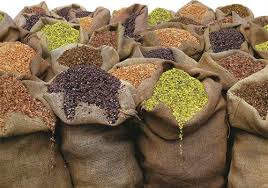
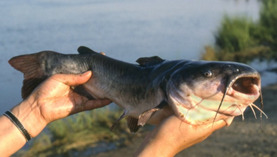
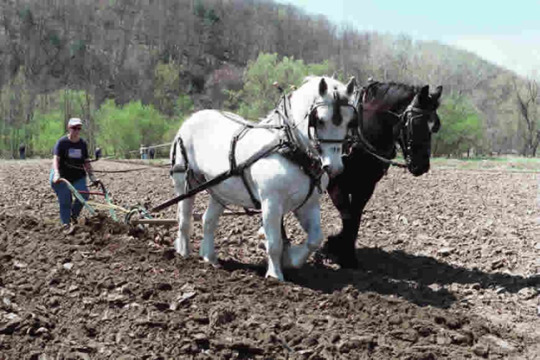
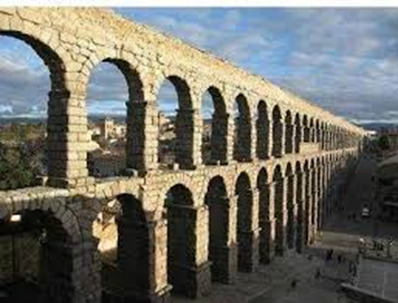
And perhaps more important, invest in each other. Keep your lines of communication open and your relationships intact. Keep your loved ones close at hand. Take extra good care of those in need. Join a co-op and learn how they operate, learn to use their systems of governance: democratic decision-making; one member, one vote; everyone gets an equal say.
Be prepared to set aside your egos and complaints so that you can work together to save yourselves and thereby save the world. Because it’s the ones we love who are the point, after all—our reasons to live.
It’s all been done before, folks, and it can be done again, assuming we have any air left to breathe. Best to start making sure of that now by planting trees and, I mean, gigantic forests full of them.

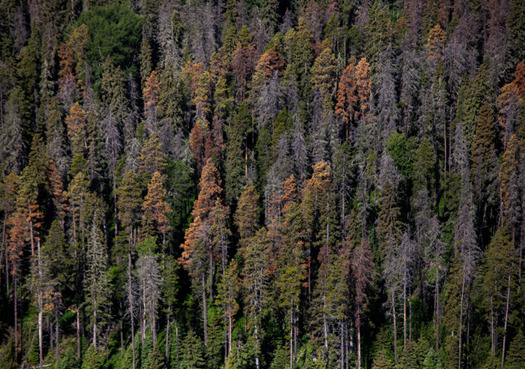
“Shovel shit till you turn blue and fall down, laugh and cry
Keep your focus, keep your eyes upon the prize
Never quit, DO NOT GIVE UP, love each other well
Please learn to steer before you drive off in the night
Take from those who went before and find your own way too
But be relentless in your protection of the trust
Make your mom’s proud and your founders rest to know that you
Will not devalue what they left or let it rust
And the magic of pure agreement, your most powerful tool
You must cherish it with all your earthly might
For it’s the whole of you, your vision, from whence attainment streams
Lock on toward It, plunge forth boldly, hold on tight
And, if I could leave you anything ... Perspective
Is the one thing I would most so love to give
A dimension to your viewpoints, a belonging
A sense of humor, history, patience as you live.”
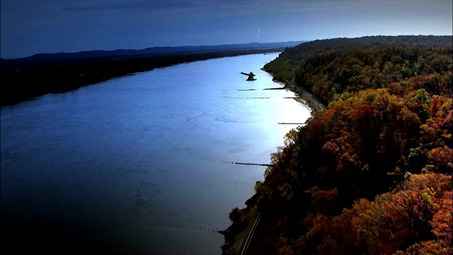
Here’s hoping that our plans and stockpiles for apocalypse are never needed.
Perhaps if we start living more sustainably now, we can improve our odds of long-term survival no matter what happens next.
I don’t pray much, but I do pray for this. It’s our one best hope.
Thank you for reading WHAT TO STOCK FOR AN APOCALYPSE. If you haven’t read it yet, please check out the companion series WHAT NOT TO STOCK FOR AN APOCALYPSE.
Please look for my novel, IF DARKNESS TAKES US by Brenda Marie Smith, ON AMAZON or at your favorite bookstore. You can order it here:
https://www.amazon.com/Darkness-Takes-Brenda-Marie-Smith-ebook/dp/B07WK9BQHN/ref=sr_1_1?
1 note
·
View note
Text
GONE TO SEA : World of Sea : Science Fiction : Part 6
GONE TO SEA
by
De Writer (Glen Ten-Eyck)
WORK IN PROGRESS (Word count unknown at this time)
copyright 2018
Writing started 2005
All rights reserved.
Reproduction in any form, physical, electronic or digital is prohibited without the express consent of the author.
//////////////
Copyright fair use rules for Tumblr users
Users of Tumblr.com are specifically granted the following rights. They may reblog the story provided that all author and copyright information remains intact. They may use the characters or original characters in my settings for fan fiction, fan art works, cosplay, or fan musical compositions.
All sorts of fan art, cosplay, music or fiction is actively encouraged.
///////////////////////
Chapter 03. The Search
Mr. Torres had the meeting chair. “It is now six months since the ESA 14 left us here. It is time for public progress reports.
“The first order of business is, unfortunately not a matter of progress. As many of you know, Mister Marcus Angerson has been removed from his post as the Station's School Master. He was caught violating the Colony Charter's Freedom of Religion and Conscience clause. The jury in his trial, only hours ago, returned a verdict of guilty of Charter violation. Along with that he was also found guilty of physical and mental child abuse.
“As we hear the various committee reports, I also want you all to think of persons to nominate for the post of School Master. That out of the way, let us get on to better things.
“We know that what we need to survive is here on Sea somewhere. The documentation is clear. This biosphere can support us, if we can isolate the particular organic compounds that we need. We have been testing everything, including the coral stones in the shallows.
“Search committee one, free swimming marine animals. What is your report?”
Tall, lanky and very Polynesian, Hugh Barant stood and consulted his data files. “The long and short of it is simple. We haven’t found everything that we need for survival.
“In the liver of Strong’s shark, that multi-tonne monster with the doubled dorsal fins with a leading edge slashing spine, we have located the entire B complex of vitamins along with so much vitamin A that the liver is toxic. The meat has enough of most of the vitamins and many minerals that it is a significant source for them. It tastes good, cooks and even preserves well.
“We have found one and one source only, so far, for Vitamin C. The red colored floating weed in the big mats, where all the birds nest, has slightly less than five grams per dried ton. The problem there is that the mass difference between a fresh batch and a dried one is over fifty to one. Too much work for too little gain. We hope to find something with better yields.
“Vitamin D can be produced in sufficient quantities by simply sunbathing.
“Vitamins E and K remain a problem. They have been found in trace amounts in various organisms. We have good hope for finding them in significant quantities if we simply keep looking.
“We found significant portions of nearly all of the minerals we need in an assortment of fish as well. The Skelton’s Sardine has a calcium carbonate/calcium phosphate skeleton and possesses significant amounts of other necessary minerals. It is another one that tastes reasonably good and packs and stores well.
“The amino acids are the real stumbling block. We haven’t found any organism that uses either thymine or lysine. The signatures were spotted from orbit but only erratically. We know that they’re here, probably in organisms that only surface occasionally.
“What I can say with some confidence is, they are not coded for in the genetic makeup of any mobile organism tested so far. The local DNA type of molecule uses a different setup from ours altogether. The result is proteins that use some different amino acids. We can eat most of the local animals and plants safely enough, you all know that. They just won't support us for long. If we relied only on local resources, we would die of malnutrition with full bellies.
“On a more somber note, Miles Ordman was killed by simply touching a specimen that has since been named the Ordman cod, in his honor. I am projecting a picture on the screen for you now. This fish is the single most toxic thing that anyone on my team has ever heard of. Careful remote dissection and sampling has revealed that it is totally infused with a fast acting neurotoxin. It causes a total collapse of the nervous system, both autonomic and sensory. The nerves lose the ability to transmit and the patient dies from any of the multiple failures that result. We have not found an antidote.
“To balance that, we have found something amusing, if not of much value. A genetic analysis of every bird that we have been able to catch verifies that they are fish. That's right, greatly modified but still fish. In fact, if our testing methods apply to so different a DNA, it appears that they changed from swimming to flying only a few thousand years ago. Our best estimate is roughly five to ten thousand years.” He sat.
Pele Barant, Hugh's wife, represented the Mechanical and Structural Engineering department. She told the assembled Station management, “First, and most important, my department, working alongside the Organic Chemistry department, has succeeded in repairing the reverse osmosis desalination plant. We now believe from analysis of the damage to it that it was sabotaged by a person or persons unknown.
“As a backup plan, we have built test units for solar distillation. It appears that solar stills will be able to support the Station's fresh water needs if the desalination plant gets damaged beyond repair in a future event.
“On a better note, we are getting useful amounts of lighter metals directly from the sea water. The only difficulty lies in the old problem of corrosion. Aluminum, magnesium and their various alloys will only last for a few years as structural materials, long enough to be useful but not really a good result.
“We can use replaceable magnesium tabs attached to aluminum structures to protect them from corrosion but the tabs have to be inspected and replaced regularly. It is also possible to coat structures with resin paints made from local materials. Like the magnesium tabs, the paints need to be inspected and replaced or touched up an a regular basis. If they are exposed to sunlight, ultraviolet will degrade most of the coatings fairly swiftly. It looks like a few years is the best protective life that we can expect, whichever system we use.
“Of the metals that we can extract locally, Titanium is still the only one that is durable. Besides being available in only small amounts, its high flammability when improperly heated or melted and the near impossibility of extinguishing a titanium fire presents uniquely dangerous working characteristics in the environment of Sea.
“Of local materials, one of the most useful has been the Strong's shark. If the skin is properly dried, it takes a micro-porous structure that is very useful for filters in many applications. Once cured, it will filter seawater prior to reverse osmosis purification and desalination. It has another widely useful application as air filters to keep out all of that pesky airborne plankton. The air that you are breathing now has been filtered by Strong's shark skin.
“We can make a pretty good Concrete in very useful quantities out of the abundant coral sand. It only has one drawback. Many organisms on the reefs appear to think that it is a fine snack. Constant vigilance and repair is necessary for any submerged structure made of it.
“Paradoxically, the concrete makes fine small boats for many applications. We can use aluminum alloy mesh for reinforcing and trowel the concrete into the mesh. Once it sets we can remove it from the form and make another boat just as easily. We only have to haul them out and dry them off about once a week to prevent the local organisms from damaging the boats. That does limit the application to smaller boats but we do need a lot of small boats.
“I am sort of walking on the Organic Chemistry team's report with the next item. The plastic resins that they have figured out work really well in many applications. Fiberglass is our biggest success story. We have both small and large boats under construction. Two of them are planned to be small ships twenty meters long with two masts. They will all have to be sailing vessels for now. We still have no access to oil or other materials that we can process for reasonably safe portable fuels.
“If the sailing boats perform as well as we hope, many more can be built. A mold has already been made for the production of hulls for a twenty five foot, uh, pardon that, 7.62 meter boat. It is to be equipped for both rowing and sailing.
“The major limit to fiberglass is that all available silicates to make the glass fibers from have to be imported from the moons. Wotan in particular is a good source. Every time that the Slowpoke shuttle can be charged for a flight, besides the metal ores that are our primary goal, it brings us a few more tonnes of silicate rocks that will process to glass with better than 90% efficiency. Some of the volcanic stone that has been found already is glass. We only have to melt and process it for our needs.” Pele Barant sat.
Gunther Halin stood to give the report of the Organic Chemistry Department's Bio-safety and Nutrition section.
“Like most of you, we have had mostly good fortune. Nothing else as deadly as the Ordman cod has turned up. The majority of the seaweeds are to some degree edible. We have not found any of them that are poisonous. The majority of edible seaweed species are not of much use. Nutritionally they are basically useless. A few have proved to be quite tasty and some have an assortment of medicinal values. A table of those properties has been posted to the station's net and will be updated as we get new information.
“In particular, the one that has got the common name of gray weed is not only tasty in salads, it forms a somewhat stiff gelatin-like binder for loose foods if mixed in, pressed and heated gently. Some few will have a religious objection to its use, so we advise labeling to identify any such products.
“The medicinal use of the raw gray weed is simple. It harmlessly and reversibly shuts down the production of eggs in female humans and sperm production in male humans. It is a great contraceptive.
“Another thing that was a mild disappointment is the common Haggers ammonite. All species have a copper based blood and bodily fluids that have proved to be mildly toxic. They also possess some fairly toxic venoms that anesthetize the bite or sting location. As a result, they need careful handling. Some species have hard, nacreous shells that are pretty and there are some free-swimming ones that have been observed in the multi-tonne size range that have a shell that appears to be a form of cartilage.
“On the plus side, all of the forms of mussel-like shellfish are not only edible, many are quite tasty. They are easily found and even raised.
“We also have a mildly humorous tale. The Moreson's eel, a common fish averaging twenty to sixty centimeters long, tested as marginally edible with some useful lipids.
“The attempt to cook it was, for practical purposes, a disaster. On frying in a pan, the fish simply came apart into two layers that set on cooling. The upper layer was stiff oily goo and the lower layer was a hard junk that had all of the bones and those parts of the fins and skin that didn't melt. We couldn't even scrape or chip it out of the pan. Trying to boil the fish gave a similar result, with hot water between the layers. We wound up putting the whole works into recycle. On a side note, it all tastes ghastly. We haven't found any use for the fish at all. Except for ruining pans and pots.”
TO BE CONTINUED
<==PREVIOUS NEXT==>
Return to the Master Story Index
Return to World of Sea
7 notes
·
View notes
Text
solving “zero” world problems
yet not solving real world or first through third world problems.
Yes, I saw a commercial for beer for dogs. Who on this planet thinks this is something we need or even want? I understand we live in a commercial society and selling products create jobs and increase the economy. Yet, beer for dogs and not even with alcohol, which is good for the dogs, but completely worthless to anyone even the dogs. Someone went to the trouble to create this just to make money, but at least create or invent something that has some viable purpose. A beer for dogs and with no alcohol is consumerism gone more than bad.
So someone thought they could make money because people think spoiling their dogs is more important than developing better or more efficient ways to feed people, or build better buildings or bridges, or more ecological friendly desalination plants, or create better healthcare policies, or what the Scottish did with building tidal driven turbines for electricity, or food we can eat with less chemicals or basically finding ways to get fresh food back into cities effectively, or finding ways to help alleviate flooding and moving water to places where it is needed, or any other numerous needs that will better our planet and help people.
And yes I know this is a this is a fighting windmills argument, but some of us need to address better use of consumerism to continue to allow us to have an expanding economy and still do something productive for mankind in general. And the irony is I could probably better use my time than write this fantasy, but what the heck.
Or we can let pet rocks rule our world.
Also prayers and help for the people of Haiti, boy do they need more than we can imagine right now.
0 notes
Text
'The ban on washing cars with tap water was just a foretaste'

Pieter Loose stood on the highest Alpine peaks, built a bamboo village in Brazil and took part in the World Rafting Championships in Bosnia. Now he shows off his water technology company Ekopak on the Brussels stock exchange. “Let us also try to become world champions in water recycling.”
Pieter Loose pulls his leg as he receives us. A muscle tear in the calf, the result of an hour of padel. These will be difficult weeks for the man in his thirties, without sports. "I'm a bit hyperkinetic. I need sports to recharge.'” He usually does that on the mountain bike. He covers 10,000 kilometres every year, with tours in Patagonia, Africa, Greece, the Dolomites. And sometimes rides of 5,000 altimeters per day. Suffering. “But for me this is pure holiday: crawling on my bike in the morning and just follow the GPS.”
Loose talks rather quietly and monotonously. Yet he is brimming with enthusiasm. "I've always had a big mouth and I've always been ambitious. But I never dared to think that my company would ever be listed on the stock exchange.” At the end of March, his water treatment company Ekopak[1], supported by main shareholder Marc Coucke, raised 50 million euros and it is now worth about 240 million euros. It is the temporary highlight in Loose's course. With Ekopak, he surfs along with water recycling technology on the realization that we are depleting our water reserves.
He paid "a few millions" for Ekopak. “It was a small, local company at the time, with a lot of knowledge. I put more ambition into it. The ball is rolling now. My dreams become reality. That gives me power.”
The company has been building container installations for many years to produce ultrapure water for chemical, pharmaceutical, textile and food companies, among others. “Compare it to a descaler for the city water in your home, to protect your taps. But we go much further." “For customers who produce high-pressure steam, the entire Mendeleev table has to be removed, otherwise those elements will affect the steam boilers,” explains Loose. “Every customer requires a different degree of purity. For cooling water, water to clean machines, water for chemical processes.”
While until recently Ekopak treated groundwater and drinking water, today - after thorough research - it starts from waste water at the companies themselves. “A technical challenge, but future-proof,” says Loose. In addition, he launched the WAAS (Water-as-a-Service) concept, whereby Ekopak not only builds installations, but also finances and operates them and invoices the customer per drop of water. This should result in unprecedented revenue and profit growth in the coming years. “We have turned a sustainable product into a sustainable business model.”
What is the driving force behind Ekopak's growth?
Loose: "Long ago, investments were made in a network to provide everyone with clean drinking water. Industrial companies have joined the same network. That was the most obvious solution. But the situation has become completely out of balance: factories today use billions of liters of drinking water per hour. This used water is subsequently treated in a biological water treatment plant to be discharged into streams and rivers. It flows to the sea and you lose it. Consequently we have to install desalination plants at the sea side that consume a lot of energy to pump the water inland again. That is not future-proof, and companies are increasingly interested in that.”
How serious are companies about this?
Loose: “Twenty years ago you had Greenpeace with a slogan like 'better a hole in my T-shirt than a hole in the ozone layer”. But that's where it stopped. Now a tipping point has been reached. Companies set themselves concrete targets for energy, CO2 and water use. This is important to attract investors, subsidies and staff. The dominoes are falling, and that's a good thing. Climate change is real.” “The water supply is under pressure. Companies are not only afraid of a blackout, but also of a blue out. We've already had a foretaste of bans on using tap water to wash cars and fill swimming pools, and bans for farmers on pumping water from streams and rivers in certain regions. Water has a value like oil. We never thought about that. But the awareness that there are limits is growing at a rapid pace. We feel that. We keeps us occupied.”
How bad is the water scarcity in Flanders?
Loose: "Very. There is plenty of rain, but because it is a densely populated and paved area, the rain disappears into the sewers instead of seeping into the ground. Moreover, we have an economy with water-intensive sectors: food, textiles, pharmaceuticals, chemicals. In the OECD ranking, we are at the very bottom for the amount of water available per person, behind southern countries such as Spain and Italy. That also offers opportunities. We are forced to find a solution: Belgium will educate the world when it comes to rational use of water. That creates companies like Ekopak. We also intend to score internationally with that knowledge.”
Is the industry the main culprit?
Loose: "I'm not saying that. There is also agriculture. And in families at home, only 10 percent of drinking water is used for drinking. We still flush our toilets en masse with drinking water instead of rainwater. But our focus is on industry, which uses a quarter of drinking water in the northern region of Belgium. If we could reduce that, we are taking a big step forward.”
What is the role of politics in the water problem?
Loose: “Everyone is aware of the issues. The Blue Deal of Flanders[2] proving it. Money is earmarked for buffer basins and more wet nature, or for reductions in leakage losses, and so on. Mandatory water audits are introduced at companies and linked to environmental and expansion permits and subsidies. It is being examined whether companies can inject any surplus of recycled drinking water into the network against payment. It wouldn't surprise me either that there will be a limit on applications for which you can use drinking water or groundwater in industry, comparable to measures for your swimming pool.”
How important is the IPO in the growth plan?
Loose: 'It is crucial to roll out the Water-as-a-Service strategy. We will not only build the small water factories at the customers' premises, but will also operate and pre-finance them. This requires money: from 100,000 to 10 million euros per installation, depending on the flow rate and quality. We invoice per drop for a period of ten years or longer. We decrease the customer’s worries. And while tap water is becoming more and more expensive, our price is 20 to 40 percent lower. We therefore also strengthen their competitiveness. That makes companies bend in our direction more quickly. In this way we can tackle the water problem at an accelerated pace.” “The IPO also generates more than just money. It gives you more body when negotiating long-term contracts with multinationals. We are now approaching them as a listed company, no longer as 'that SME from Tielt with a skilled CEO'.'
Do you already have customers for that new concept?
Loose: “Eight projects are up and running, among others at the chemical companies Eastman[3], the copper film producer Circuitfoil[4] in Luxembourg and the vegetable processor Darta[5]. An installation has been started up at the pharmaceutical company Takeda[6] in Lessines to reuse 600 million litres of waste water. That's the equivalent of 18,000 people's water use, which means all of Lessen. We actually connect an entire city to the water network in one go. I also see many small and good initiatives, such as trucks collecting construction site water. But what we realize is of a different order. We are going fast, and sustainability knows no bounds. We also go abroad. Takeda wants to roll out our technology in its factories worldwide.”
You have now lost control of Ekopak. Is that difficult?
Loose: "The opportunity we now have to move forward gives me more satisfaction than the idea of being one hundred percent owner of a small company from which you are not getting the most out of it."
Source
JAN DE SCHAMPHELAERE, Ekopak-topman Pieter Loose: 'Het verbod om auto's te wassen met leidingwater was slechts een voorsmaakje' in: De Tijd, 24-07-2021,
https://www.tijd.be/ondernemen/technologie/ekopak-topman-pieter-loose-het-verbod-om-auto-s-te-wassen-met-leidingwater-was-slechts-een-voorsmaakje/10321369.html
[1] https://ekopak.be/en/sustainability/
[2] With the Blue Deal, the Government of Flanders is increasing its efforts in the fight against water scarcity and drought. With this deal, it wants to tackle the drought problem in a structural way, with an increased deployment of resources and the correct instruments, with the involvement of industry and farmers as part of the solution and with a clear exemplary role for the Flemish regional and other governments in Belgium. The Flemish Decree on Integrated Water Policy is officially approved in July 2003 (Belgium Law Gazette, 14.11.03). This decree is the juridical implementation of the European Water Framework Directive and the Floods Directive in Flemish law. https://www.integraalwaterbeleid.be/en
[3] Founded in 1920, Eastman is a global specialty materials company that produces a broad range of products found in items people use every day. With the purpose of enhancing the quality of life in a material way, Eastman works with customers to deliver innovative products and solutions while maintaining a commitment to safety and sustainability. The company's innovation-driven growth model takes advantage of world-class technology platforms, deep customer engagement, and differentiated application development to grow its leading positions in attractive end-markets such as transportation, building and construction, and consumables. As a globally inclusive and diverse company, Eastman employs approximately 14,500 people around the world and serves customers in more than 100 countries. The company had 2020 revenues of approximately $8.5 billion and is headquartered in Kingsport, Tennessee, USA. The chemical company has 2 plants in the Ghent harbor in Belgium. https://www.eastman.com/pages/home.aspx.
[4] Circuitfoil develops; Produces and markets high-quality copper foil, while constantly ensuring a safe and healthy environment in its plants, processes and products. rom its corporate headquarters in Luxembourg, Europe, the company distributes and markets its large range of products through a wide network of service centers and sales companies to customers worldwide. https://www.circuitfoil.com/company/profile/
[5] d’Arta is a Belgian family company founded in 1988 that has grown into a global player in the development, processing and commercialisation of fresh frozen products such as vegetables, fruits, herbs and ready-made (side) dishes. It employs more than 900 people and export our products to more than 100 countries. https://www.darta.com/en
[6] Takeda is one of the 10 largest pharmaceutical companies in Belgium. Takeda’s presence in Belgium is reinforced by its global manufacturing site in Lessines. This Takeda site has over 18,000 m² of building surface and operates 24 hours per day, 7 days per week. It is a flexible plant for purification and a packaging center for immunology and hematology products, covering a total geographical span of over 80 countries worldwide. In total, more than 1000 professionals work for Takeda in Belgium, making us a top 5 employer in the pharmaceutical industry. https://www.takeda.com/en-be/who-we-are/contact-us/
1 note
·
View note
Text
Hadn’t She Told You? (Zelo Hospital AU)
Requested by: a lovely anon
Word count: 7 k+
Genre/warnings: fluff, hurt and comfort. Involves medical conditions of main characters such as broken bones and cancer, so in case uncomfortable with reading such content, reading something else is advised.
Summary: Since the first time he saw her around the hospital, he figured he wanted to strike up conversation. And ever since it turned out she felt the same, things seemed to head into the right direction. That is, until he found out a detail she had never told him about before - like the fact she had a diagnosis with a rather scary name, though it didn’t scare her at all. What frightened her instead was the fact she thought he might leave if he ever found out.
(A/N) In full honesty, I had a hard time approaching this subject at first. I also felt like adding an author’s note because I wanted to say something, but am quite lost in my own words currently. To anyone out there who might be facing any health-related issues, I genuinely wish you all the best and hope everything will eventually turn out fine.
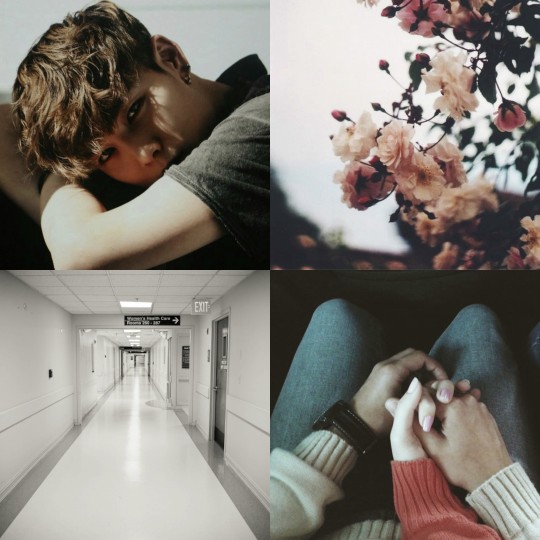
"It really does look a lot better than last week, Mr.Choi," the doctor adjusted his glasses, looking down at his papers once more before staring back at Junhong who seemed to be just a little bit less excited about the news than he should probably be, "Still, at least another two or so weeks of bed rest and additional tests and treatments are required for a full recovery. I know that you are required to be back on track as soon as possible, but upon request you were advised to do a definite, full course of treatment before joining your schedules again. We could always rush the process and all, but I really would not want any possible complications to occur, so the decision to keep you here for a little longer was made. It's for the better."
The doctor hadn't even managed to properly leave the room yet as a familiar head popped out of the doorway. The squint that was directed at Junhong made him smile a little, and as his youngest hyung entered the room, Junhong scooted a little bit closer to the edge of the bed, offering some space for him to sit down on.
"I heard him say two weeks," Jongup said quietly as he sat down, looking at Junhong with concerned eyes, "They're not gonna like it."
"As if they ever like when any of us have issues," Junhong chuckled back a little, looking out the window, "As if they ever care for real. Even now, if it wouldn't be for the public and their frustration about the announcement I'd be joining the next fanmeeting despite my injuries, I wouldn't be here. I'd be out there, doing schedules, no matter if it hurts or not."
It was spring already, and the blossoming leafs, the dim, faded sun and the creatures coming back to life were the only things making his days a little more beautiful and bright now that he was in hospital. His stare stayed directed at the very corner of the window, where the sun poked through branches subtly to greet him with it’s shine. Out of all hospitals, he was lucky to have been brought to this one, as it was more on the small side, and even resembled some type of pretty resort due to it's beautiful surroundings and the overall quiet atmosphere.
"Don't pay attention to it," Jongup made him look back at him, sounding all too serious to be in his normal spirit, "Yongguk hyung already gave a piece of his mind about the situation in public, earning like a wave of agreement that you should rest. I know you were excited for the comeback and all, but believe me. Recovering is more important than pushing yourself and getting to a possible breakdown afterwards. Take your time. We understand, and so do babyz, so does the rest really matter?"
Jongup really went out there, making Junhong's heart feel a little lighter about the situation. He smiled at his hyung again, and without any further conversation, started reaching for his crutches that were leaned against the side table.
"Junhong-ah, what are you doing-"
"The weather's so pretty today," Junhong said happily, already scooting even closer to the edge of the bed to get off, "You won't make me stay here all day, will you?"
It was when he said his farewells to Jongup that day that he noticed her again. Walking a little further in the distance, her profile of a goddess peaking out from between the branches of some bushes as she passed by them, her feet producing a light tapping sound against the cracked asphalt. Jongup was still shedding some last reassuring words, saying that Yongguk had promised to hop by tomorrow while Himchan had stated that he'll come around whenever his additional schedules wouldn't be that tight. Junhong managed to do as much as say his grateful goodbyes in reply, and watch Jongup leaving quietly as he himself leaned back on his crutches and stumbled down the same path beauty itself had walked down just a second earlier right after.
He had seen her around every now and then since he got here a week ago, after the most unfortunate night he’d had in his life so far. It felt quite crazy to him, to know he had been in hospital for a quarter of a month already, but that's what he got for thinking it was a good idea to go and drive around the streets of Seoul mid-night when he couldn’t fall asleep. He really couldn't have guessed that he'd get into a car crash with a drunk driver then and there, and would get himself into such issues because of simply wanting to be alone for one night.
But all he could recall now was the burning pain he felt in every single one of his bones when he lied all cramped up, thrown over the steering wheel of his beyond damaged car after the impact with the other vehicle. The flashing ambulance lights and the paramedics freeing him from the painful state just for him to realize he was in even more pain when moved around. The doctors and nurses rolling him off to get him stitched up in operation rooms. The whole of B.A.P basically throwing themselves at him once he was all fixed and doing all simultaneously - scolding him for getting in such a situation, promising to never ever leave him alone and unattended anymore, and saying how thankful they were than he was alright after all of that. His family was doing the same to him next thing he knew, and he didn’t even mind - he knew he deserved all the scolding, and was grateful for all the love.
But it was all just a memory now, and the only evidence left was his nastily broken leg that was bandaged up in tons of layers, with the bone having been cracked and split in various places vertically instead of horizontally, and the few stitches up his side that, thankfully, didn't hide an all too dark truth behind them - he indeed looked quite miserable on spot back then, but upon inspecting the wounds, it was thankfully announced that no life-threatening injuries were caused.
He was quite lucky, actually. It could have gone worse.
As he was remembering all of this now, he barely noticed as she took a turn to the left, seemingly heading to the quieter part of the hospital territory. He tried to stay silent and fell back a little, as if not wanting to disturb her. As if not wanting her to see him, since he thought he couldn't just walk up to her and say something crazy.
Something like "So, hey. I have actually been quite depressed about getting into a car crash days prior to my group's comeback, and getting shit from my company didn't help at all. But your pretty face and the way you were always quietly walking around and helping people whenever I looked out the window did help a lot. So did that one time when my incompetent ass had the crutches out of reach, and you were observant enough to notice that I was struggling and kind and caring enough to pass them to me accompanied with a subtle smile. You got me intrigued."
His mind also lingered at her that evening when he was lying in bed and browsing through his phone again, as he oftentimes did now at free times. Yongguk had texted, saying the time of his next day's visit, and after responding, Junhong simply put his phone down on his stomach, crossed his arms over his chest and closed his eyes.
Two more weeks. Two more weeks, and he'd be out of here. He knew more than well that those two weeks he had to still stay here weren't only because of his weirdly broken leg and his still mildly aching side - they were a story made up so that he wouldn’t feel bad and wouldn’t try to join schedules again as soon as possible, since the guys wanted him to properly recover first. They knew what was best for him, and that was resting.
The moonlight crept through the windows, and it attracted his attention. The shine was quite pretty, and his mind told him it would be a nice sight to witness while being a bit closer to the window. So, somehow stumbling to the desired desalination, he cracked the window open before sitting down on the sill and staring out, as well as wishing his room would've been located on a higher floor than the first, a bit closer to the source of light.
He saw something moving in the shadows not far away, and his eyes subtly followed the silhouette that was walking past. And, upon realizing who it was, his heart started beating just a little faster.
She was a little surprised to see a guy sitting on a window sill and just staring off somewhere the way he was, but as their eyes locked, she saw he had a lot on his heart and mind. And, despite any assumptions she had, as she'd been seeing him around here in the last week or so and he had always looked like a lovable dork, it was undeniable. Something was burdening his heart, and it could be seen in his sad eyes.
It was a start. A smile at each other, and a wave of his hand that she returned. A way to say that "Hey, I know we both ended up here for different yet probably unfortunate reasons. But you seem sad, and so do I, so maybe, just maybe, we could brighten each other's days a little."
"So, who is she?"
Was he being a creep? Hell, he hoped the kid he'd just casually struck up conversation with didn't think that way, though she didn't seem concerned about Junhong's presence at all, as to her, he probably resembled something among the lines of a kind giant. She was a lovely girl about the age of ten, her hair in two ponytails as she leaned back indefinitely to look at his face.
"A friend," she said, her walk much slower than it was before. He was still on his crutches after all, his movements rather slow and limited, so she showed some understanding and slowed her bouncy walk already a while ago, ever since Junhong saw her conversing, laughing and even hugging with the mysterious girl he'd been trying to chase since he got here before walking off and, well.. Bumping into himaccidentally.
"She is the best roommate I could imagine," the girl said in a happy manner, walking on the thin line that separated the grass from the pavement, "All the nurses are her old friends, even old Mrs. Kang who, in my opinion, doesn’t even remember how to smile, and so is everyone who ever got to know her! God, I want to be like her so much, she is so nice as a person-"
Something darkened in her face all of a sudden, but Junhong barely noticed, still completely mesmerized by the way the little girl talked about her. Though when he finally did, he furrowed his brows and decided to ask her about it.
"Is something wrong?"
"Yeah, I just remembered something!" she said frantically, her head snapping back and looking at the place she just came from, "I completely forgot that I took my kite out, since today looked promising enough to go and fly it! Oh god, I must've left it somewhere."
"No worries," Junhong was glad there wasn't an issue bigger than a simple kite, "Let's walk back to find it. I’m sure it’s still there."
"Are you sure I'm not disturbing you, mister?"
"Junhong. Just call me Junhong, "mister" sounds like I'm hella old already," he chuckled, and saw her face showing a little relief alongside amusement, "And honestly? I have absolutely nothing to do. Like nada. No plans and no ways to spend my free time. So I'd be glad to help."
Halfways through their walk back, a voice he recognized only faintly rang through the air.
"Jaeeun!"
He saw her in the distance, smiling and jogging over to them. Kite in hand and an eyes sparkling with happiness, or so it seemed.
"There it is!" Jaeeun happily received her missing item, smiling at the retriever of it, "You indeed are the best!"
Both girls smiled at each other before Jaeeun seemingly remembered about Junhong's existence, and upon turning to him, told him with a smile.
"See, Junhong? That's why I want to be like her. She is the absolute best."
"Oh shush, stop telling lies," her smile widened and her cheeks tinted a light shade of pink, which seemed adorable to him, "And remember that you have an appointment at three. Half an hour left, so I'd advise you to go and get ready."
"Okay, I guess you're right," Jaeeun admitted more to herself than anyone else, and next thing he knew, Junhong was left alone with her as Jaeeun ran off into the distance, thanking her one last time for finding the kite before vanishing.
"So, Junhong, huh?"
"I mean, what was I supposed to do? She kept calling me "mister" and I'm not ready to feel that old just yet," he smiled back at her cheekily, seeing how she chuckled in response. He was quite shy, but he figured she was even more shy than him. So upon getting an opportunity to speak, he decided to use it wisely.
"They doctors and nurses already call me Mr.Choi, so I'd love to be simply Junhong again."
She gave him another laugh and this opportunity, promising to call him by name rather than anything else. Giving him her name in return, which he engraved into his mind, loving the sound and feel of it.
"So, any particular reason for conversing with Jaeeun?" she said as they started to walk away, her steps careful next to Junhong who was trying to hold up as fast as he could on crutches.
"She kind of bumped into me earlier and then started apologizing like crazy. And then she remembered about leaving her kite somewhere, and we went looking for it," he said, not lying in the least. She did indeed not watch where she went, yet the bump was much milder than she thought. No damage caused - just a chance for him to find out more about the beautiful girl walking next to him now.
"Oh my, I will make sure to tell her to be a little more cautious when running around," she said, her brows furrowing a little, "That girl's got so much energy, I can barely keep up with her. Sorry if she caused inconvenience."
"No worries, actually, it made the day better," he said, making her raise a brow at him, an amused smirk on her face as she awaited explanation.
"How's that?"
"It's so boring around here, I swear," he whined, making her chuckle at how this lose to meter ninety guy in his early twenties sounded like a tiny, pouty kid, "I'm waiting for my hyung to come visit, but, like.. Before and after that, absolutely no fun. I just wit around, then lie around, and then get scolded for walking around too much."
"But you really shouldn't do that," she told him, her voice displaying a surprising amount of worry and concern, considering the fact he was still a stranger, "You should give your leg some rest.”
“Should I give it a break?”
She laughed out loud immediately at his play of words, her eyes wandering to scan over his amused facial expression, his smile indicating he thought he had just made the joke of the century. Which he kid of had, to her at least, as he had just managed to make himself come off as even more lovable than prior to this conversation. And it would be a lie to say she hadn’t admired him from afar already.
“No, don’t give it more breaks, it’s broken enough already. I heard you had your bone split and broken vertically, which is supposed to be much more painful than a regular broken bone-"
Her eyes widened as she realized she had said too much. He had immediately caught onto the fact she knew a piece of info about him that he hadn’t told her, meaning she got it from somewhere else as it wasn’t written down on a label and stuck to him, and he carefully watched her from the corners of his eyes, seeing as her cheeks flushed and her hand rose to clasp her mouth shut.
"So you've just randomly heard it around the place, hmm?"
"Well, I might have asked a nurse friend of mine after that one time I passed you the crutches, a few days ago.."
His heart fluttered at the fact he had caught her eye enough for her to actually want to find out about who he was. And seeing her blushing so much about it, he wanted to just tell her that it was alright. He didn't mind. In fact, he liked it.
"Thank you for that, by the way. I felt quite helpless back there."
Both of them chuckled, and as they neared around the corner of the hospital, he saw a familiar figure climbing down from a familiar Vespa.
"Yongguk-hyung!"
She jumped a little at his sudden outburst of happiness, and her stare trailed to where his had gone to just to notice a skinny guy getting off of a scooter, slowly turning to Junhong and replying to his energetic and hectic waves of his hand with a smaller, less noticeable wave back.
"That's the hyung you were talking about, right?"
Junhong looked down at her and smiled, his smile seeming so warm and inviting. Seeing it up so close was definitely much better than getting quiet glances of it from the distance.
"Yes. My oldest hyung, he's basically like a brother to me."
They both shared a few more neutral phrases paced around for a while, and from the corners of her eyes, she saw Yongguk approaching slowly but steadily.
"I guess I will go now then."
He looked back, a little confused, a little sad. But he quickly understood she felt out of place at this situation, and was understanding for her point of view and her desire not to disturb.
"Okay," was all he replied with, though as she had already turned on her heel and started slowly walking off, he turned to her quickly and blurted out.
"I'll see you around, right?"
She stopped a little and smiled, hoping he asked because he liked her company and not just to be polite, because she sure liked his, as it was mood-lifting and full of positivity.
"I mean, sure. You'll be lonely once again when your hyung leaves, so maybe I could keep you company.."
Yongguk had come with only good news. His backpack was full of gifts given to him or any of the other guys for Junhong by the fans at the recent fansigns, and he promised that the next one to come around to visit would be Daehyun, another two days from now, and he'd bring along Mochii, possibly Kanji as well. Though Junhong wasn't even sure if pets were allowed anywhere neat the hospital territory, he just hoped Daehyun accompanied by two dogs wouldn't be directed back home at the very first gate that lead into the territory. He really, really missed not only his hyungs, but also his dog.
He had to make it to an x-ray this same evening, and simply sat around inspecting what Yongguk had brought him up until then. He barely noticed how it had been hours already as the notification on his phone went off, and he sighed, pacing around and collecting a few things before heading out of the door and into another part of the hospital.
Once he came back, one more surprise awaited him, in the form of a note on the ground that had been slipped into the room through the little space under the door.
I’ll be free tomorrow at six. In case you have no plans and still feel lonely, I’ll be somewhere in the waiting room of your department. W could hang out or something.
Her handwriting was so pretty, and as his fingers traced over the letters of her name she had signed the paper with carefully, he couldn’t help but smile. She had gone all the way here to let him know she indeed wanted to spend some time to him. She had made the efforts to find out where his room was located in order to indeed see him around.
She was actually going to see him again.
He felt like an idiot for having come around half an hour earlier than planned, sitting around on the nearby sofa and patiently fiddling with his fingers at half past five already, but as she walked through the door at a quarter to six, their stares met immediately and their cheeks flushed a reddish shade rather simultaneously.
“And I thought I was early.”
“Well, you are,” he teased, seeing as she blushed even more, “But I was earlier, so I guess I should blush harder than you.”
He chuckled at her face showing indefinite surprise at his cheeky remark, but she took it as a compliment rather than judgement. She took it as him saying he really, really appreciated her coming earlier, as it showed she kind of cared. And he apparently did too.
“There’s more people here than I thought there’d be though, so how about we just go back to my room?”
She nodded quietly, and rushed to him immediately to help him stand up when he did so with mild troubles, as the new cast that had been put on his leg just the same morning felt about a ton heavier than the previous one. But he simply chuckled in reply, thanking her for her concerns and admiring the way she blushed as she realized she had just basically unintentionally thrown her arms all around him. Without further ceremonies, they went down the corridor to get to the desired room.
“Haven’t you mixed up departments, sweetie?”
She smiled kindly at the woman who had just greeted her, and judging by the badge that read “Head nurse, Mrs. Kang”, he assumed this was the never-smiling nurse Jaeeun had talked about, though she didn’t seem all that heartless at all. But maybe it was just because of the person whom she was talking to, as Junhong was certain that no one could have any hard feelings towards someone such as the girl accompanying him this evening.
“Same to you, Mrs. Kang. You have wandered far from your workplace too.”
“I had to get a few papers down to the main office, and just took a shortcut,” she eyed Junhong up and down carefully as he bowed to her a little politely, her brow rising at the sight of them together, “You seem to be here due to having found company elsewhere though.”
“Yes. This is Junhong, my company for the evening.”
“Nice to meet you, young man,” the nurse said before starting to head back to her department through her desired route, “May you two have fun on your date.”
As soon as the word “date” left the nurse’s lips, Junhong saw her yelping at it a little and looking lost beyond belief. And he wondered - was it the fact she didn’t want to deny the statement, or maybe the fact she wanted to deny it as much as possible? He decided to take his chances and risk it, as when they walked further down the corridor, he quietly asked her.
“When was the last time you actually went on a date?”
“Long ago,” her voice suddenly sounded all serious and maybe even melancholy-filled, “Before.. Before certain events happened in my life. Not that I remember all that clearly anymore.”
And quickly understanding that this would be a personal story reserved for her to reveal to him maybe at another time, he simply smiled down at her while unlocking the door to his room, and said.
“In that case I apologize, for this might be a quite unplanned date. As well as I apologize for just taking you to hang out in my room and nowhere fancy. But I’ll do better next time.”
It indeed felt like some weird type of date. For hours upon hours, they were seated on his bed, chatting the time away and laughing at lame jokes. He showed her all the things Yongguk had brought along, bragging about having the best fans and, upon realizing she didn’t catch on or didn’t really know if he was being serious at first, had to explain what he did for a living. She ended up being mesmerized by his stories, even more by his songs, as well as ended up telling him her plans, and the different things that lied in her dreams of the future, and upon listening, he indeed had to admit he was amazed by her. By how fondly she talked of all her dreams, and how determined she was to reach them. As she had been talking for what seemed to be dozens of minutes at once already, she suddenly got quiet upon seeing his dreamy eyes and his longing stare that was directed at her.
“I’m.. I’m sorry.”
“What for?” he questioned, mild confusion displayed in his eyes as he saw her biting her lip and looking down on her hands that were resting on her lap.
“I’m sorry for just, you know.. Babbling so much. I can sometimes be quite inconsiderate of others unintentionally, I doubt you wanted to hear all of that-”
“No, I did,” she stilled all of a sudden when she felt his hands landing on top of hers, the warmth they offered seeming oh so inviting. Her eyes met with his again, and she saw no hard feelings in his stare. In fact, his eyes were sparkling to some extent. They seemed encouraging and as genuine as they could be.
“To be completely honest, I really like your company,” he couldn’t say this bit to her face though, and turned away as he still felt the shyness creeping up and taking over his abilities to strike up a normal conversation, “And whatever you’re comfortable to tell me, you can, you know.. Actually tell me.”
“So you’re saying I could pull out my phone and show you a gallery full of cat pictures commenting every single one and you’d still be interested?” she chuckled, quickly understanding her wrong use of the word “interested”. She meant it as in “interested into conversing”, though it came out as her questioning if he was interested into her as a whole. Though, seeing how his smile unfolded, she felt as if nothing could go wrong at this point. She had just met him yesterday, though he had already managed to make himself feel like a safe zone which she could go to whenever she desired.
“Only if I can pull out my own gallery with dozens of pictures of my dog in response,” she laughed, and smiled to herself as she heard him saying quietly.
“You can show me whatever. I feel like I’ll genuinely always be interested.”
It was more than just flattering, and whenever she glanced at Junhong, she indeed felt her heartbeat increasing a little. He was clearly in for conversation, in for getting to know her. He was clearly interested.
But for the rest of the evening, she kept on worrying about how interested he would still be if she told him the complete truth. If he knew what department her room was located in, if he knew her reasons for being here, as over the time, this hospital had become more like a home to her than he knew or she liked to admit, and she feared he would see her in a different, more pitiful light if he indeed found out what she was suffering from.
Two weeks flew by faster than he thought they would, and he felt much more mobile and free at moving around when he was scanning all over the room for the last time to see if he hadn’t forgotten anything here. His duffel bag thrown over his shoulder as he leaned on one crutch instead of two now, he felt a light tap to his shoulder from behind that indicated he had to go.
“I’m ready whenever you’re ready,” Youngjae who had come to pick him up and drive him back home announced, holding another one of Junhong’s bags in his hand, “Let’s go.”
He walked through the corridor, feeling as if he would weirdly miss this. For the last two weeks, his world had been turned upside down, and until recently he never knew that a single person could stir such emotions inside of him.
But that’s the power she had over him, and part of the power she had over everyone here, really, as once he befriended her, he saw how much better she was than he thought previously - not that he ever though bad of her. How anyone who engaged into conversation with her seemed just a tad bit more hopeful afterwards, no matter their initial bad thoughts and conditions. How she didn’t fear people because of their injuries or illnesses, and didn’t put a label on anyone prior to knowing them. She was so, so nice, and as he recalled all the late evening talks they’ve had almost every night for the last two weeks, he knew he would miss them.
And upon leaving she was the last thing he saw. Standing and waving at him silently, waiting for him to come up to say something. Something good, preferably, which he indeed did, giving her an embrace and making her blush as his nose stroked against her ear and he whispered to her, so that no one but she would hear.
“I did promise you that second date, right? The fancy one, if you remember. So how about next time we meet I’ll take you out for dinner?”
“I’d love to,” she admitted, and felt him pressing a barely-there kiss to her temple as a thank you.
“Thank you for getting me through the dull days. I was really in need for such company,” he said before pulling away and slowly departing, and as she watched him leaving through the doors with Youngjae who was already bugging him about who this mysterious girl he was all cuddly with just now was, she felt tears brimming at her eyes, though she didn’t let them slide over her cheeks.
What would he think of her once he found out?
He was actually unable to function as he finally heard it. On top of that, from no other that Jaeeun.
“She is where?”
“Getting treatment,” Jaeeun repeated it as if it was the most normal thing in the world, her legs dangling over the edge of the chair she was sitting on. Her curious glance met Junhong’s pained expression, and as soon as she realized he didn’t catch on, she wanted to clarify.
“Hadn’t she told you?”
“N-no, she hadn’t..” Junhong’s glance wandered over and across the floor, his heart clenching and shattering into pieces with every passing second that Jaeeun kept talking on.
“That’s how we first met, actually,” she remembered with a smile, “I was directed here from the children’s department, and since she was alone and without a roommate at that time, she was kind enough to let me stay with her. My parents say it is a good thing I got paired up with her. They said she was nice and responsible, and would be a good influence. My mom actually even became good friends with her. They always talk a lot when they meet.”
Half the information went past his ears as he stared down at the ground, and tried to recall a time she had possibly mentioned it. Hinted it, maybe, though he couldn’t recall the conversation going this way like ever. When they first met, she never told him why she was at hospital too. Hell, he didn’t even know what department she was in back then, as they always spent time in his room and never in hers. And he also never asked just because he saw she didn’t really want to share, and he was polite by giving her privacy.
“Say, Jaeeun,” his voice cracked slightly, to which she gave him an alarmed glance, “What.. What else do you know about it?”
Jaeeun said she didn’t know all that much, as her companion had never been all that vocal about her health condition. Even on her worst days, she would smile through the tragedy and sadness and always come back from appointments, check-ups and treatments in a good mood. Even when others would cry at the situations she went through, she would quietly say it was nothing instead, and would focus on other’s issues not to think about her own. Turns out even on the day when Jaeeun wanted to fly the kite she had gone through morning treatment, and it hurt Junhong to know how he was so, so clueless about all of the pain she had to go through back then.
And as her footsteps filled the hallway, he hoped he wouldn’t let her see him crying, because he sure felt like it.
“J-junhong-ah, what are you d-doing here?”
“I came to pick you up and drive you home,” he said quietly, not looking her in the eyes, “Forgive me for invading your private plans, but.. You left your planner on my kitchen table yesterday, open on this week’s page. An appointment was written in there, and..”
And what?
He was so concerned when he saw it, a thousand different possibilities running through his head. Back when he had actually taken her out on their first real date, she told him she had one more week left at the hospital before she would be free to go home. And ever since then, life seemed to be normal. They were just regular people. Setting up meetings with each other at places they desired, slowly yet steadily falling in love with each other. Exchanging feelings, eventually sharing a first kiss, then another one and a few more. Starting to call each other sweet names, realizing this was for real. Realizing that what they shared now was a relationship. Realizing they didn’t want it any other way. Like ever.
And through all of this, she showed no signs of health issues whatsoever - not that she let him know of any, at least. And it scared him to the last bone when he actually flipped through her planner upon seeing the lone writing about the appointment, just to find many more identical ones all through the planner. He cared too much not to find out what was wrong after seeing all of that.
“.. And I wanted to see what it was that you had seemingly been hiding from me all this time.”
She didn’t budge, and poor Jaeeun took turns to look at both of you, her head turning from right to left and from left to right as she tried to formulate a fitting and appropriate sentence.
“Junhong, please, don’t be mad at her,” the girl said, seeing as she stood a few feet away still, her eyes threatening to spill some tears as they refused to look back at Junhong, “She simply didn’t want to upset you. She didn’t mean any bad-”
“I know,” Junhong finally said, rising up to his feet slowly, “I know that. I am not mad or anything either. I’m just.. Taken aback.”
Her hand landed in his, and saying quiet farewells to Jaeeun, they walked through the hospital hallways and out of the building in silence, with Junhong walking half a step ahead from her and not sparing her a single glance. Through their ride home, not a single thing changed, and she felt so empty and hollow while looking out of the passenger seat’s windows, seeing as lamp posts, buildings and people flew by as they drove down some busy streets. She felt like her life was flying by now the same way as well as she wondered what would come. Wondered what he would tell her now.
As they stepped through the doorway of her apartment, they didn’t say a single word to each other while taking off their shoes and hanging up their jackets. Her heart was still aching from this silence he offered her, and as tears threatened to spill once again, she turned to face him and asked him quietly.
“Please, Junhong-ah. Don’t hate me, I.. I really meant to tell you, but..”
His arms wrapped around her without hesitation, securing her in place as he leaned down to press a kiss to her lips. And as the tears finally started coming, he carefully wiped all of them away from her cheeks with his thumbs, swinging their frames from side to side and filling the empty void inside their hearts with unconditional love and affection, since he felt like nothing else could fix it at that point. Since he felt like he has had enough time to process the first load of info, and simply wanted to ask her to know the rest, since he cared about her, and wanted only the best for her.
“I could never hate you,” he told her quietly, looking right into her eyes as his thumbs still traced over her cheeks, “Okay? Don’t you ever think I could possibly hate you, especially because of such reasons..”
They spent the afternoon tangled up on her couch, thin blanket over their intertwined bodies as the afternoon sun peaked through the closed blinds and tried to get in their eyes. He had requested her to tell him everything, but only if she felt comfortable with it. And had pleaded her to at least tell him the main situation if she didn’t want to go into details, so he wouldn’t be completely in the blue. Because he cared about her and loved her, and wanted to help her in case he could somehow.
She told him how it started. How and when she heard the diagnosis for the first time, and how it had been hell at the start. How she spent her nights worrying about what was to come, withstanding pitiful glances of people she knew and hearing encouraging words that didn’t encourage her at all. How she hated the fact everyone saw her for her issue and not for who she was ever since she was diagnosed with cancer, and how what hurt the most was to see the pain in her relatives and friend’s eyes.
“I saw so many pained faces, and all of a sudden, I felt like I was a disappointment,” she kept fiddling with her hands, surprised at how it poured out of her like a waterfall while he quietly listened, “I felt as if I was hurting less than the people around me, because in case things went wrong for me, I mean.. I wouldn’t be there to witness it all. But they would see it first-hand, and would feel all bad and devastated, and..”
She sighed, and he pulled her into his chest. For a while, they lied in silence, with his hands carefully cradling her body, his fingers running over her sides in calming motions that indicated she could take all the time she needed. He was a patient listener and could wait for a moment.
“You know, it’s quite stupid, but.. I saw you back in the hallway for the first time as I passed from one department to another, and couldn’t quite take my eyes off of you,” she chuckled a little, at this point feeling like she wanted to tell him absolutely everything, “I had just lived through a rather hard phrase regarding treatment and staying positive and stuff, had been in hospital for longer than I wanted to admit. And let me tell you, never have I seen a guy like you there.”
“Someone so big yet helpless since my crutches were out of reach and I was flailing around with my arms aimlessly?”
She laughed a little, moving closer to him as he chuckled too, and despite the hard topic, she felt the atmosphere around them brightening a little, “Kind of. But what I meant to say, someone with such curious and bright eyes. It kind of reminded me of what I had promised myself to do ever since the diagnose. Hospitals are a dull place. White walls and pained faces everywhere. And though I had promised myself to not let a diagnose bother me when it came to living to the fullest, having been in hospital did drain my spirit a lot. But seeing you back then reminded me of how I wanted to be happy. How I had promised myself that.”
“And then we talked, and you were so nice, and.. I liked you so much from day one,” he smiled at that, remembering how it was all the same to him. How her smile alone had already mesmerized him enough for him to develop a desire to get to know her.
“But I still remembered how the word “cancer” always stuck into people’s imaginations and memory better than my name, and, besides, I didn’t know how to tell you. I didn’t want you to feel pitiful towards me, or to see me simply as another patient. I wanted you to see me as me, and not someone beat up by their illness. I wanted you to genuinely like me and not be simply polite because I was having a hard time and you’re made of sunshine.”
He understood her reasoning perfectly. It was crystal clear to him, her desire to not tell him so he wouldn’t draw assumptions or conclusions before he got to know how amazingly beautiful inside and out she was. Strong-willed, strong-spirited, kind and positive.
“I didn’t want to hear the regular stuff about keeping on going through the battle, it’s kind of repetitive and has lost it’s meaning along the way anyways. I didn’t want you to think I was weak and helpless either, I just..”
“..I kind of wanted to simply seem normal to you. And wanted you to love me normally. And, well, I guess I was also being selfish, because, forgive me for thinking bad of you, but.. I wasn’t quite sure you’d want to love me at all if you knew I had cancer.”
She felt him pressing a kiss on top of her head, to which she closed her eyes and patiently waited for his reply. And quietly exhaled when the question he eventually asked was a simple yet important one.
“How bright does the future look?”
“Promising,” she told him quietly, feeling how his lips curled into a tiny smile, “It’s moving forwards slowly, but it’s getting better. The treatment’s been successful for now, no complications or anything anywhere, so.. I’m positive about it.”
“..Good, because I’ve planned a whole happy-ever-after for both of us, which involves me loving you unconditionally through all your ups and downs from now on and until forever. And whatever might try to take it away from us won’t quite work.”
She stayed close to him like this, feeling all tired and sleepy because of all the shaken up feelings from earlier. And just like that, to the sound of him telling her how he understood why she stayed silent about it, how this didn’t change his perception of her and how she could always count on him for anything, she drifted off to sleep, seeing the scene of how they first met in her vivid dreams while he simply held her, thinking of the future and eventually falling asleep himself as well.
“You’re here!”
Jaeeun flung her tiny arms around her neck as she knelt down to pick her up, and spun the little girl around a few times, their joyful laughter mixing up in the air and attracting the attention of others nearby.
“I promised I would come to see you after your last doctor’s visit, right?” she smiled at the little girl, “You’re a free, independent woman now. I wanted to be there to witness that happening.”
Junhong stood just a few feet away from them, unable to hide his own smile away from these two. What had initially brought them together was their issue and condition, as they shared the same painful truth and diagnosis. But what they shared now as well was a positive outcome - Jaeeun’s cancer had been retreating efficiently, and today was her final day after another round of hospital visits before she was free to go home and start leading a normal life again.
“You were there after my last visit, after all, right?”
Junhong remembered it clearly. How, despite anything she’d ever told him about her living to the fullest and trying to pay less to no attention to her sickness when it came to living her life the same way like she used to, she has never looked more joyful than after leaving the doctor’s office with nothing but good news. How she smiled as he held her tightly, and mumbled about how the nightmare was going to be over. How she wouldn’t hurt anyone anymore, to which he told her that she should think not only about others, but about herself sometimes as well. To which, once again, she looked up at him, and sweetly told him that he would put her first in case she wouldn’t, and his love had been enough for her to become happy once again. Telling him how he made her remember her objectives, made her want to stick to them, and to realize the always had support right there by her side.
Jaeeun’s patents soon came from around the corner, and upon polite and upbeat small talk with them, Junhong together with her watched their silhouettes walking down the hallways, Jaeeun walking hand in hand with her parents and looking all around for what seemed to be the last time for a much longer period of time.
“I’m so happy for her.”
Junhong quietly hummed in agreement, his arm wrapping around her waist and pulling her closer to his side. She leaned her head against his shoulder, and for a while they simply stared down the corridor, remembering all kinds of things.
“You’re in the wrong department again, sweetie.”
She turned around to the familiar voice of Mrs. Kang, smiling ear-to-ear and bowing politely at her, saying her greetings and how glad she was to see her and to know she was doing alright.
“You two are quite inseparable now, I see,” she eyed the way Junhong was holding her carefully and lovingly down in a curious fashion, “Still helping him to get around? That’s what you initially wanted when you asked me about him for the first time, right? Just to help him a little, since he looked quite clumsy and clueless on how to even use crutches.”
At this point, Junhong’s loving laughter was already piercing through the air, and without looking down at her he already knew she was blushing a lot.
“He wasn’t really supposed to know that...”
“Well, too bad, the gossiper in me just said it out loud,” Mrs. Kang smiled at them one last time before leaving them to return to her duties, “Young man, treasure her well, please. She is a sweetheart who sure deserves it.”
“I will!” he shouted out before being left alone with her, feeling how she hid her blushing face in his chest.
“Mystery solved,” he kissed the top of her head as his arms wrapped around her, “Now I know how you knew about my weirdly cracked bones. And the room number and everything..”
She offered silence in return, her face nuzzling deeper into his chest. So adorable and shy, it was how she first looked to him. So head-spinningly sweet and lovable he had a hard time not telling her flat-out.
“Nothing to be ashamed of though. After all, I liked you too.’’
And as she looked up at him, he didn’t hesitate to press a kiss on her slightly agape mouth, and smiled at her before stating the obvious.
“And now I don’t even just like you anymore. I love you. And you better love me back in return, or I’ll be really, really sad otherwise.”
“I do, you fool,” she laughed out, and as their hands intertwined to walk back out of the hospital building, she couldn’t help but think that not every experience of hers related to this place had been bad.
She met him at this hospital, and he was by far one of the best things that had ever happened to her. And as she felt his hand that was placed into hers tugging her along, she figured she never wanted to let go. Not that he would ever let that happen anyways, as by the looks of it, he was leading her off to that happy-ever-after he had promised her before, his steps feather-light and his heart full of unconditional love and support which he all reserved for her.
Guiding her from the very first moment they met, and forever from now on.
#b.a.p#bap#baplibrary#zelo#junhong#choi junhong#choi junhong scenarios#b.a.p junhong scenatios#choi junhong imagines#zelo scenarios#bap zelo scenario#b.a.p zelo scenarios#bap zelo scenarios#B.A.P Zelo Scenario#zelo imagines#bap zelo imagine#bap zelo imagines#b.a.p zelo imagine#b.a.p zelo imagines#b.a.p scenarios#b.a.p scenario#bap scenarios#bap scenario#bap imagine#bap imagines#b.a.p imagine#b.a.p imagines
27 notes
·
View notes
Text
a week and a half of revving my engine
This last week I thought a lot of time thinking about what my project could be. It feels like I’m back at square one in a way, but I think that moving through all of the ideas that I’ve had has made me come to more manageable decisions - even from last week.
I had originally come back to this idea of playground, or taking a literal piece of another world and planting it on the school patio or parking lot roundabout, something that be big, stand out, stand in it. But I think that I don’t have enough time for this!
After speaking to Sophie and Keith, I realized that I can still approach the idea of design fiction or even a counterfactual through a single object. I think I’d like to do 2-3 objects to get a rounded understanding of what ‘objects’ might be in this world. Even the word object, sopping with use, may not be applicable in the final work. Sophie mentioned how nature and technology are often at an impasse, oil and water. Carbon technology may be a way to move away from that idea.
This week, Neri Oxman did a quick chat with Paula Antonelli about some of her work in material ecology. One thing that stuck with me was her explanation of the same issue, the oxymoron of nature and tech or material/anthromass as she says, that it is an oxymoron only until it isn’t true. She spoke about the idea of reincarnation. I thought about planned obsolescence. Currently it’s a false obsolescence, it exists forever in dumps, buried in the ground and contributing to the Anthropocene, or in the ocean as micro-plastics clinging to the gills of fish. If we are designing with nature, we need to understand nature’s process, which includes the process of death, or true obsolescence. How can it go back? I’m glad she made a point of saying “NOT circularity, but reincarnation”. In third year, we did a project on circularity, and its faults seems glaring to me. This idea of the circular design system is false as well - the material will always end up as garbage. It’s more of a spiral than a circle, the recycling only prolongs the cycle. This is not to say I don’t support re-use and recycling (if things actually get to recycling and not the Phillipines as Canadian trash), but I don’t think it’s the answer to our massive and wicked problems. Our anthro-mass outweighs naturally produced biomass globally. That is INSANE.
Neri also spoke about templating; this helped tie together some thoughts I had been having about politics of use and humans’ issues with control. How can I create, take ownership for work done by other species, or avoid ideas of ownership altogether but still have some control of material direction. Neri spoke about how her team uses generative modelling, programming, and ‘templating’ to create an idea of where the direction of the work may go, but leave a lot of the actual understanding of how things will be brought together to the other species, such as silk worms. If I am imagining myself in this other world as a ‘designer’ or hacker or builder or whatever word makes better sense, I think this idea of scaffolding the intent is where I need to be going here. How can I support other species to create in tandem with us, in a way that remains beneficial and non-exploitative for all parties involved. ..or is that putting a lot on myself? hahahah
I often hear retorts to this co-exist idea with Darwin’s survival of the fittest, but in reading more about Darwin’s work, it seemed survival of the kindest was much more akin to his beliefs. I heard an incredible story on the radio today about the Monitor Lizard. Recently, Monitor Lizard numbers have been dropping because of a poisonous invasive species called the Cane Toad. For this reason, scientists have been researching the Monitor Lizard more closely, and discovered something incredible about the way they lay their eggs.
The Monitor Lizard lays its eggs underground in a burrow, but a burrow unlike any other. They dig down into the earth in a helical pattern, digging for up to 3.6 meters! The giant underground network is then used not only by the lizard to lay their eggs, but 750 individuals of 28 different vertebrate species in a combination of 16 warrens made up of many individual nesting burrows and a handful of foraging burrows. This blew my mind. This lizard - a massive, dangerous predator - was not only coexisting, but building the structures in which to do so. The scientists who discovered this warned about the decline in Monitor Lizard population because they also maintain these burrows, preventing them from caving in and allowing species continual safe refuge.
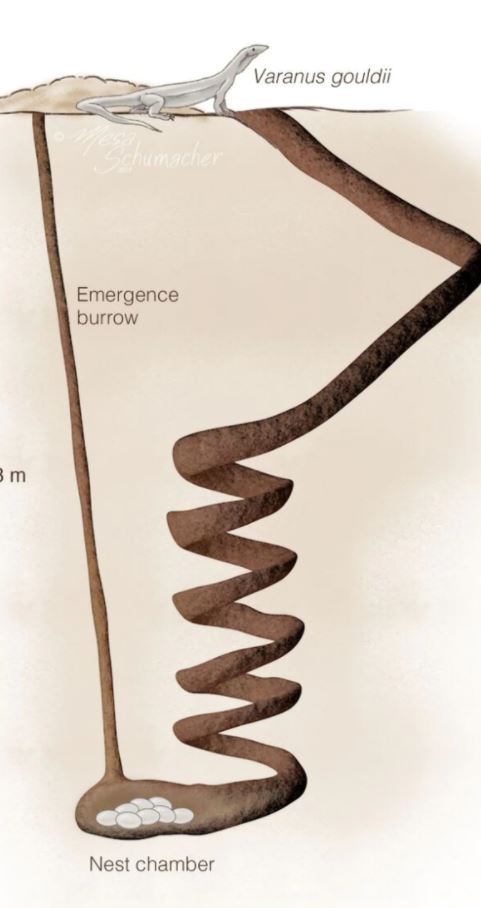
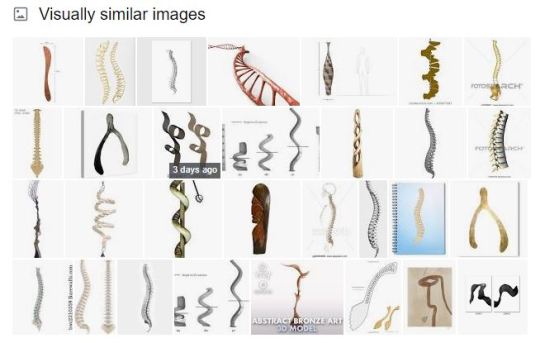
I feel as though our narratives of killer stories that we have pushed onto nature are becoming increasingly moth-eaten. There is this interconnectedness, this holistic entanglement (as this project was first called) that creates a mesh of life that supports all of us. I thought it was really beautiful while reverse searching this image in hopes for a fuller version, that Google’s algorithm pulled results from DNA strands, human spines, wisps of smoke. These visual comparisons feel like some kind of key in unlocking meaning the world - like how tree branches look like lung bronchioles or how wool looks like mycelium, or how onion rings look like tree rings, or how a myriad of other things mimic each other in form.
I watched a show called Alien Worlds this weekend - it’s like Planet Earth, except astrophysicists and astrobiologists estimate what lifeforms would be like on other planets. It was amazing to see how science uses fiction to not only project onto other planets, but also interrogate our own planet, trying to go back and forth between planets to understand the other. Many times in the show, I found myself asking whether the planet they were on was Earth or an imagined one - like the Danakil Depression in Ethiopia - so incredible! This show reinvigorated my sense of fiction as a real way of working through problems.
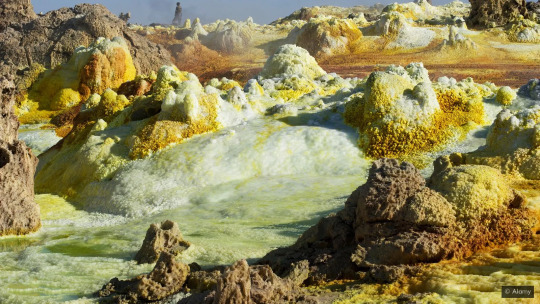
^This is on Earth, the Danakil Depression in Ethiopia
So I have been doing more than just reading and watching and listening (although I believe these are all valid forms of work for my project).
I’ve really been thinking about what the final form is going to be.
In this world, biomimicry will not be a word because it will not be an outlier activity that needs to be defined, as it will be part of the makeup of how the world works. I want the items to feel as though the integration of nature is seamless, somehow harnessing its ways of working through templating structures.
In these drawings, I was thinking about comparing things we use now to how they would look in this other world. phones for communication might not rely on sound but on vibration to transmit messages. Maybe sound or bioluminescence is a language of its own (or hacking into a mycelium network). I was trying to mimic patterns of deep sea squids for their light patterns. I thought about combining a free energy coil with a spinning magnet that smacks against a crystal - this, in theory, could actually act as a battery (the coil itself would be enough, but hitting a magnet on a cystal supposedly acts as a capacitor from what I’ve read, so it would be a way of storing energy in a natural way)
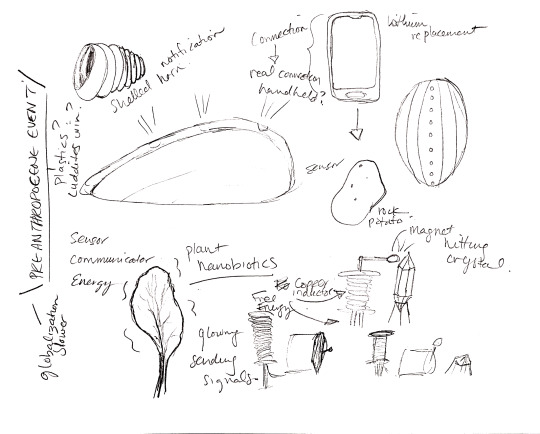
Below I thought about screens, and how often we use them. I found a video on youtube that shows how to use smoke to display video. Could steam from a geyser or from dry ice work in the same way? I also thought about direct reciprocity - offering the privilege of warm-blood to our cold-blooded creatures. (although I’m also thinking about layered reciprocity - again, to reference Alien Worlds - the snottites in extremeophile caves - bacteria feeding off chemicals, the snottites dripping into the pools below, feeding the fish, the fish giving off chemicals, etc)
I’ve been thinking about ceramics because there is this connection to earth in a way that many other mediums don’t have. I was thinking about Markus Kayser’s Solar Sinter, how technology like that could be better integrated into nature and used for building materials or even for creating art. I imagined a tree hanging over a beach with a large lens grown into a crotch in the branch. As it sways over the sand below, the lens magnifies the heat from the sun and creates a glass structure beneath it.
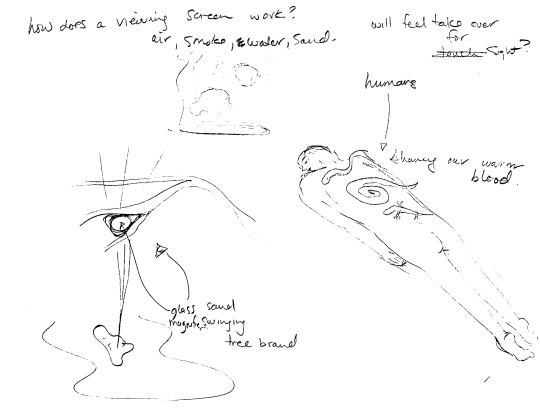
I started thinking more about bioluminescence, knowing that some seaweed hsa that property. I also found out that certain lichens glow under UV blacklight (also scorpions, as per the Alien Planets show). I think there’s something that feels otherworldly with bioluminescence, and it may be a good way to visually connect other worlds with this world. (also thinking of Sputniko’s transgenic silkworm bioluminescent jacket here) I bought a UV flashlight and am going to take it out to explore the forest at night for inspiration!
In my world, I thought about structures. As Sophie mentioned carbon-based technology, I tried to imagine what an engineered version of this would look like? bioluminescent seaweed lights up when agitated, what if we could use this as an indicator of chemical agitation, such as water pollution, or maybe even engineer the algae to create freshwater - desalinating pockets so that we don’t take too much from our finite sources of freshwater.
I also thought about the possibility of asking for help with health indicators. If, for example, this world is part of a counterfactual where we responded to environmental warnings back in the 70′s and we did not spiral into the sixth extinction; we would hypothetically preserve many species extinctions, including those who have gone extinct before we had a chance to ‘discover’ them. In this thought, I thought about a species of leech that developed bioluminescent qualities, such as the algae. We can interact with the leech by allowing it to take a sample of our blood, and we can read the colours it flashes back to us as an indicator of our blood levels or heart rate, respiratory rate, blood pressure, etc.
At first I imagined this as the real-world exhibit prototype - a porcelain that you put your finger into, a sensor triggers a motor that triggers an arm with a spike on it to prick your finger. This tells the computer to turn the lights on, and a projection of a leech-like shadow swimming inside, that flashes colours.
My husband is a film maker and I was asking him how this could be done and he just said to me “why would the leech be in a container in this world?” and I said back “well, it would be this pocelian hub that sticks out of the water with a finger hole in it so you knew where the leech was”... and he kind of looked at me and said “why don’t you just put your finger in the water?” .. duh.
So I thought about a different way, a MUCH easier way - I can create 3D model of a leech/fish, 3D print it and make a silicone mold with a cavity inside. I can then take a simple swimming motor from a childrens toy and hide it inside, insert an LED, use a silicone shell to make it water proof, and have it swim around in a tank as an example of what it would look like. I really love this idea as it speaks to extinction, other creatures, and reciprocity as well (feeding the leech).
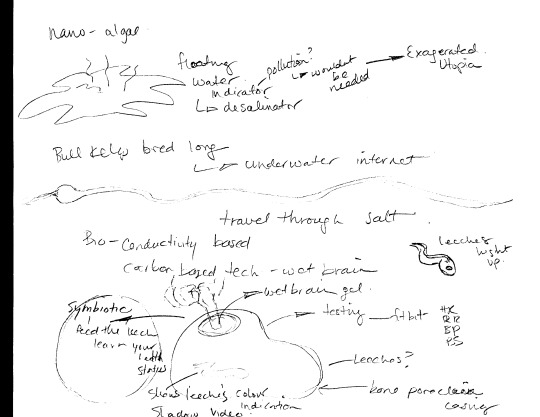
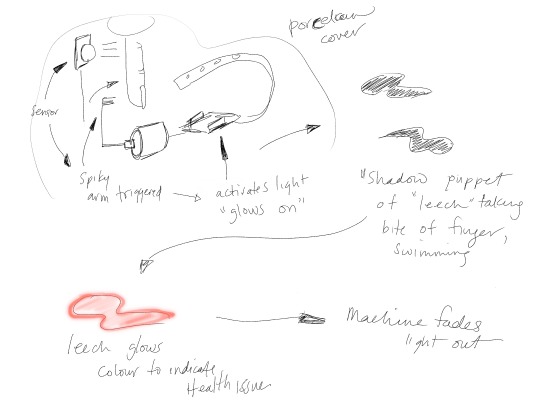
I was thinking about infrastructure, and what a harmonious city might look like. I was inspired by Naomi’s work with rope, and thought about cities that don’t cut down trees - how ‘sidewalks’ would become raised paths, made of strong grass rope.
I also thought about seaweed as a solar panel, as I was inspired by plant based solar cells. What if street lights absorbed energy through the day and emitted a green glow at night, all through natural means?
I thouht about meditation too, lowering ourselves into the earth to be literally head-level with other creatures. It reminded me of something I had written in second year, and I like that idea of embodiment being an important tool in understanding.
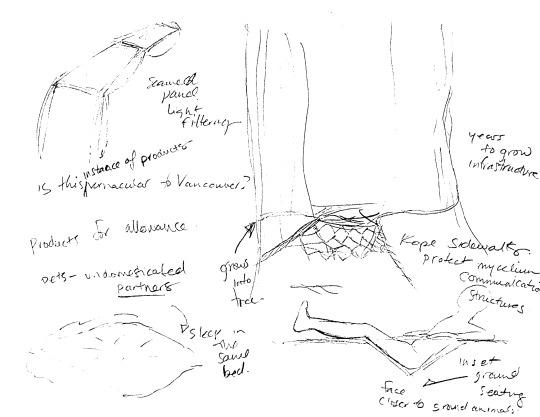
I feel that I’m starting to gain traction in a direction, bringing these heady ideas down to the ground.
I started to look at places that sell live algae culture, but most of them are far away, in the states or beyond. Of all the places I looked, I took an exasperated swing at craigslist and found someone in Surrey who sells live algae for aquariums! So I ran out and bought a bottle. I also bought some grow lights and plan on expanding this bottle so that I can create a little algae cloud. I don't know if this is bioluminescent, but I feel that through growing the algae I might find other uses for it, or somehow add bioluminescent bacteria into it, or something.
I asked my dear friend Rylee, a biologist at SFU about what to do. He gave me a big run down on how to make algae from natural sources (he got back to me after I bought this bottle). I asked him about bioluminescence, and he replied:
“ hmmmmm. ya. i dont know of any freshwater bioluminescent algae altho im sure it exists. lots of saltwater diatoms and other non-algae like protozoans or bacteria. theres lots of research on using bacteria to flouresce to indicate all sorts of things. most are genetically modified. im curious how u wud fake it. haha”
The algae that I bought is cultured in saltwater, maybe if I grow it in salt water I might have a chance on introducing bioluminescence?
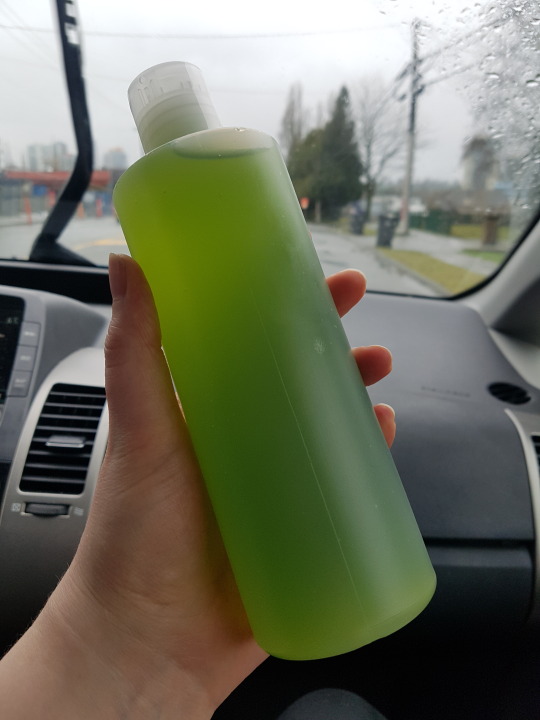
I was doing some other reading, and thought about technology and nature again, and had a thought about circuit boards. Most electronics work off circuit boards, but why does the board have to be hard plastic?
I emailed Tim in the interaction design about it, and he told me that PCB printers use extreme heat for an extended period of time, and for that reason, most organic materials don’t work. However, I knew about conductive thread, and Tim reminded me that the Soft Shop might be able to help me embroider a circuit onto the seaweed.
So Tomorrow I am going into the soft shop to work on that. In the meantime, I experimented with sewing copper wire into kombu. The kombu was fairly sturdy, but the grain of the kombu made it difficult to sew as you would with a regular fabric.I tried to sew a rip together, and it seemed to hold while wet. As it dried, it separated, but didn’t tear other than where the original tear was.
Imagine an internet of seaweed, flowing circuits of kelp forests lighting up, powering the world. I’m really into this direction!
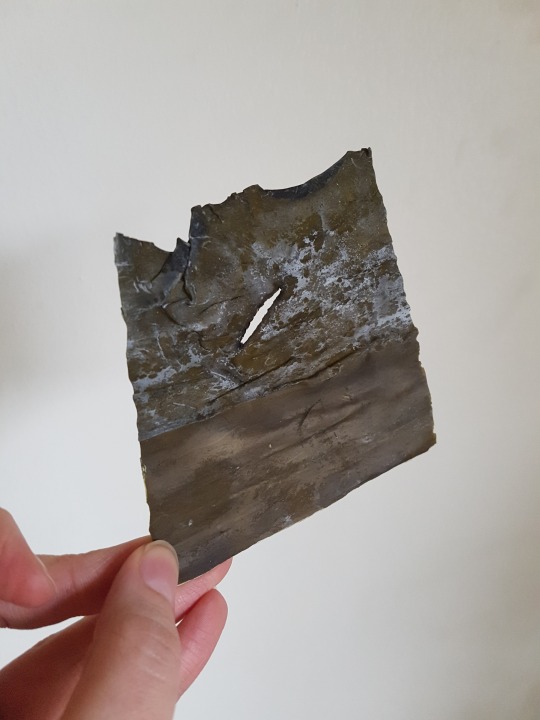
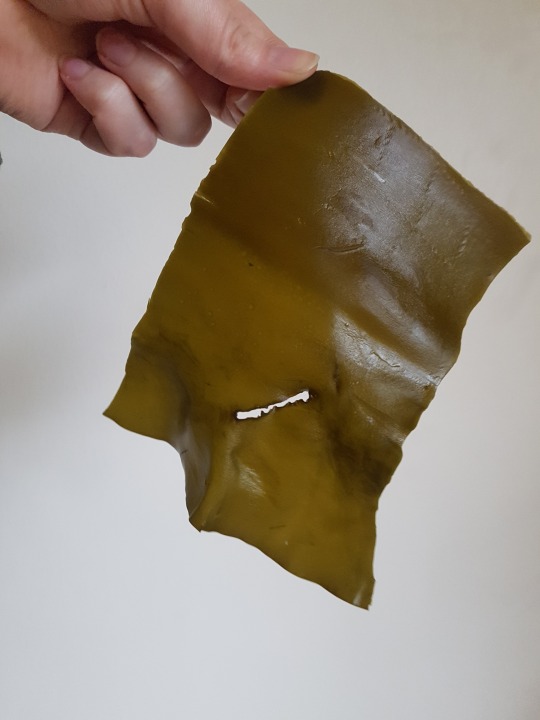
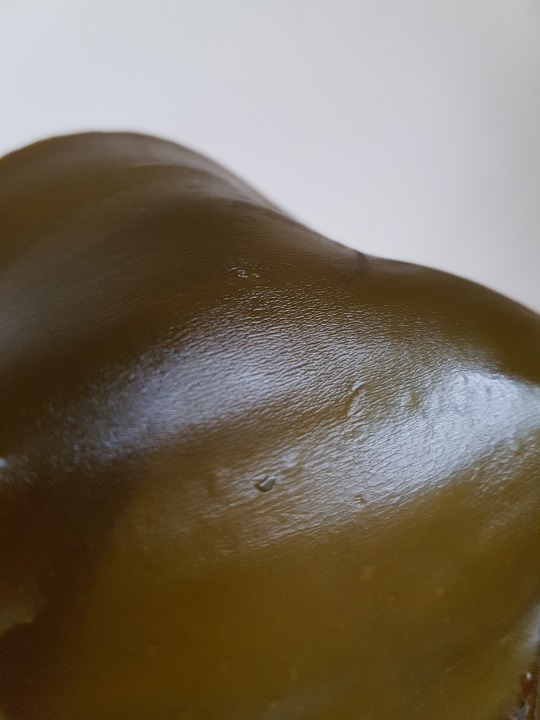
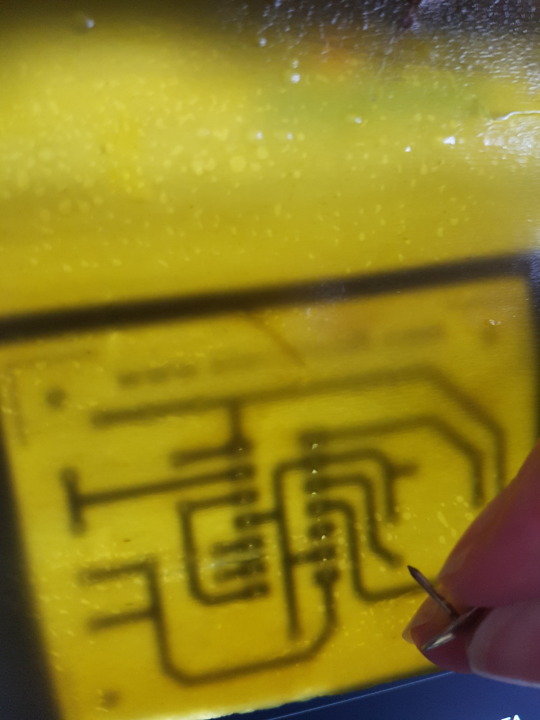
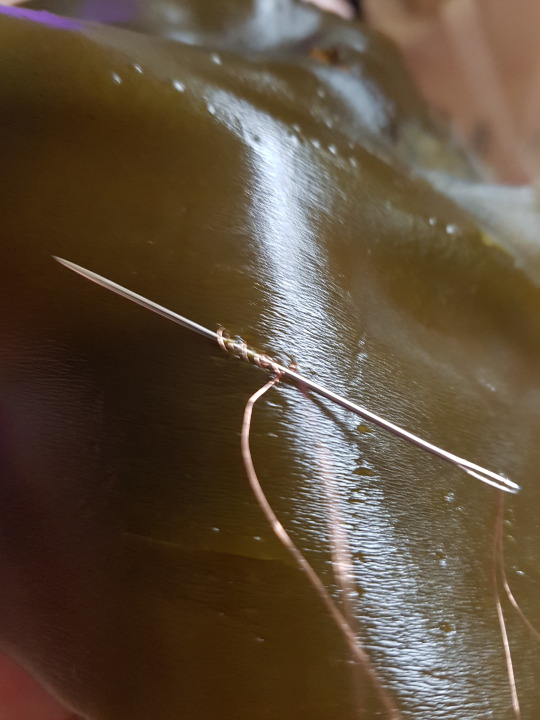
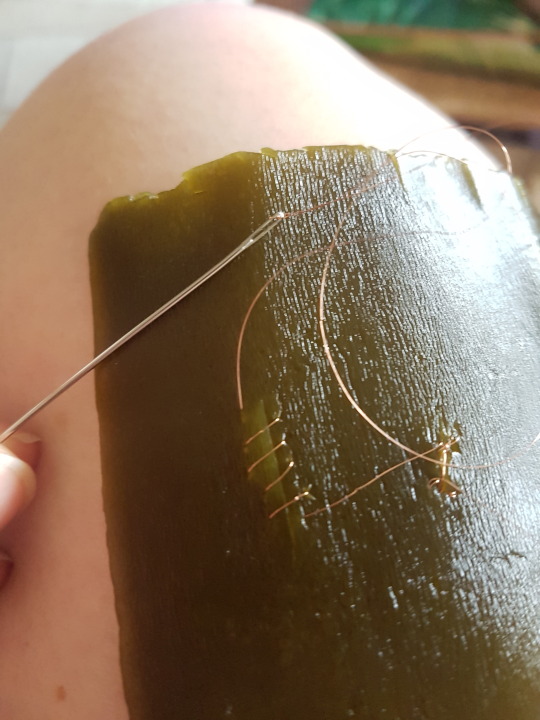
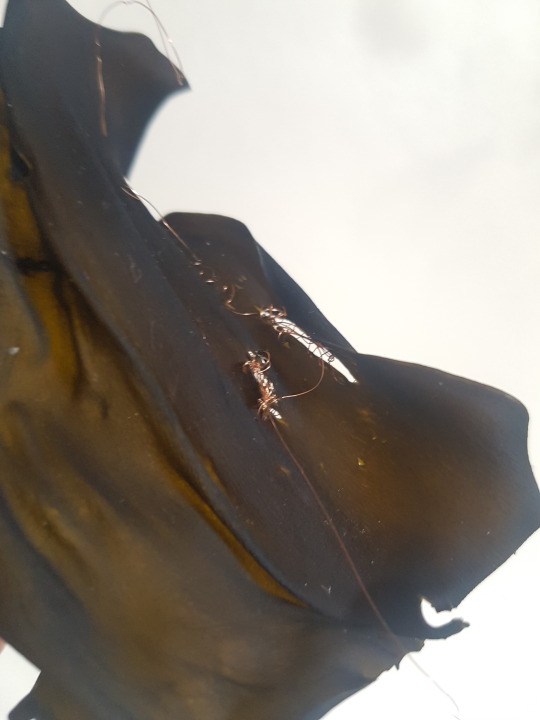
0 notes
Text
January 3, 2021
My weekly roundup of things I am up to. Topics include dietary needs, farmer well-being, cooking, reform, vaccine distribution, scientific progress, and a health update.
Dietary Needs
I got three sections done on Urban Cruise Ship this week. The first of them is on Dietary Needs. The main goal here is to have an assessment of dietary needs for the purpose of recommending food production systems. It does little good to focus on raw calorie count but then be deficient on vital nutrients. A secondary goal is to identify solutions for meeting needs that are currently unmet. Iodizing salt is one key example of this.
Like most sections, what I have now is only a start. But a start is necessary before the finish.
Farmer Well-Being
The second section is this one with several aspects of farmer well-being. A couple of interesting points:
- Urbanization is driven by three major trends: rural-to-urban migration, the indigenous growth of cities, and the reclassification of villages as cities as they grow. Most development literature focuses on the first trend but neglects the other two.
- There is some anxiety in the literature about the “uncontrolled growth of cities”, though I have yet to see a good exposition of how and why urban growth should be controlled. I remain skeptical. Nevertheless, I had gone into this topic expecting to find that the literature was generally anti-urban, and I have found it to be much more nuanced than that.
- Estimates vary, but I figure that about 1% of the Earth’s surface area is urban. Meanwhile, agricultural yields are still growing and population growth is slowing. For these reasons I think it is very unlikely that urbanization would pose any real threat to food security.
- Urban agriculture is a complex topic for which there is limited data. But unless we are talking about greenhouses, hydroponics, or other forms of intensive agriculture, I would not expect urban agriculture to be very important. It is something people generally do for exercise or aesthetic reasons, not to grow food.
- A number of NGOs extol the value of “local knowledge” in agriculture. I cited several studies that look into the subject more deeply, but I don’t have anything quantitative. Obviously there is a danger of romanticizing indigenous cultures, but it is something worth looking at more seriously.
Cooking
The third section I did this week is on Cooking. The use of polluting, biomass-based cookstoves is perhaps the leading indoor air pollution issue globally. While we debate electric versus natural gas stoves in the Western world, moving to any form of modern energy for cooking is far more important. Aside from pollution, traditional cooking takes a lot of time (estimates I’ve seen are hundreds or even thousands of hours per year) gathering fuel, which is unpleasant, especially if the fuel is animal dung.
Despite the risks, I did cite the AGA study I mentioned a few weeks ago that it costs $572-806 per ton to decarbonize by banning gas appliances. I don’t generally like citing industrial trade groups since there is an obvious bias, but after looking some more I still don’t see any other reliable estimate of carbon mitigation costs.
I also whipped up a chart of saving energy while cooking. Efficiency matters too, though I am generally skeptical of highly distributed solutions because it is not easy to make the general public change cooking habits. But there are plenty of small, easy things on the efficiency front.
American Reform
This Palladium article came out a few days ago, arguing that reforming American institutions is the answer to the threat posed by China’s rise. It is worth reading.
I’ve generally taken a dovish view on China. Not that I think the CCP is admirable in many respects but I see little coming from the Chinese that is a real threat to American power or well-being. Furthermore, even as the United States has its own challenges going forward, China is facing severe demographic and debt crises and is probably not far from its geopolitical high water mark. Avoiding the impulse to panic is the wisest course.
Nevertheless, articles such as the linked Palladium one use China as a bit of a morality tale: it’s a pretext for the United States, or the Western world more broadly, to get its own house in order. In this regard the China threat is perhaps a noble lie: a statement that is not true but is meant to motivate valuable action.
Vaccine Distribution
This week there has been much anxiety about the slow pace of vaccine distribution in the United States. These articles by Marginal Revolution, Scott Aaronson, and John Cochrane are good representatives.
“Distressing” would seem like an understatement of the appropriate response to the distribution. The CDC initially proposed on racial equity metrics in vaccine allocation, a plan that bears an uncomfortable resemblance to eugenics. Aside from that, the obsession of distributing vaccines in “the right order” seems to have displaced the need to do it quickly. Thousands of people are dying every day in the United States. The seeming lack of urgency about this fact is probably the most disqualifying fact that has emerged about the public health profession.
While distribution could be much faster, I’m not sure we’re doing such a terrible job. The United States is one of the better countries in terms of vaccines distributed per person. Commentators have compared the US unfavorably to Israel. It seems to me that Israel is an exceptionally well-run country by many metrics; another example is the rate of water recycling and desalination. Israel, along with Singapore, Taiwan, and a handful of other states, seems to show high levels of state capacity. Replicating that is far from a straightforward matter.
Any serious attempt to look at the Covid-19 failure will have to grapple with the fact that failure seems to have been uniform across the federal, state, and local governments in the US, as well as the fact that most countries did poorly. Hopefully the final chapters of this episode are now being written, but with the new variant, with high reproduction rate, spreading around the world, I am worried.
Scientific Progress
There continue to be a flurry of articles about scientific progress, including this one by Eli Dourado which is pretty good. Eli makes a strong case that there are many technologies on the drawing board, and the world is not facing apparent stagnation for want of ability to invent new things. We have to look harder at the diffusion mechanisms. Apparently it is much more difficult to make robots do useful things than to make them dance.
What Eli doesn’t do so well is give us a sense of what those diffusion mechanisms look like. The basic question I want answered remains: why has productivity growth slowed most of the time since the 1970s and especially since 2005, and what if anything do we expect to be different about the 2020s such that diffusion would increase again?
A couple of nitpicks, since Eli goes into some topics that I work in. It it my understanding that the main bottleneck to wind and solar expansion right now is siting, not energy storage, and so the extended discussion that Eli gives to energy storage may be premature. He discusses enhanced geothermal, as have several other commentators recently, which is a bit puzzling to me since enhanced geothermal has been a hot topic since at least the 2000s, and I don’t see a lot of sign that things the area has significantly evolved recently. He discusses small modular reactors, noting with disappointment the recent delay in the NuScale project, though there isn’t a serious attempt to examine the drivers of nuclear costs. There is also discussion of electrolyzed aviation fuel, a concept which I support but I doubt will be economically viable this decade.
Maybe the 2020s will be the decade for autonomous vehicles, drones, and tunnels. The first two of these items have been on the agenda for a long time, and why they haven’t been commercialized already gets back to the question of technology diffusion noted above.
Regarding farming, I continue to expect that greenhouses and hydroponics with natural light, rather than vertical farming, will be the main drivers of agricultural intensification. Even with recent advances in LED technology, artificial lighting is just too expensive. And we can still get plenty of agricultural intensification with natural light. Eli predicts that lab-grown meat may be successful where plant-based meat substitutes are not. That comes down to market acceptance. Plant-based options tend to be cheaper and have lower environmental impacts. Established options like the Boca Burger have shown that they have a market, albeit a limited one. Why will lab-grown meat have greater market share? This could very well be the case, but I’d need to see the reasoning for it.
Health Update
With the start of the new year, this seems like a good time to take stock of where I am health-wise.
I was in quarantine for two weeks at the end of December. My wife was in Floria, and due to potentially being at higher risk, I decided to be away from her. Quarantine time was extended because she got a minor cold. All measures taken to avoid the virus are either underreactions or overreactions; the trouble is that we don’t know in advance which is which.
I was feeling under the weather for the first two days this year, but now I am better. Aside from being a bit more tired than usual, by all outward signs I have recovered to pre-stroke levels. Being tired may be an after-effect of the stroke, the result of being cooped up in a hospital bed for a while, or it may be a long term trend that I didn’t notice until now.
My appetite is down significantly; again it is not clear why this is the case. This is a welcome change, since I have lost about 10 pounds since the peak and I was getting pudgy before (I still am a bit). I also drink one cup of coffee per day, down from 3+ before the stroke. This is due to a lack of desire for coffee, not any deliberate effort to cut back.
Some time in January I am due to go in for an angiogram, which should check whether the procedure I had in September was successful. I don’t know if the Covid situation has disrupted that schedule.
0 notes
Text
Squeezing more out of taps: How Cape Town cut consumption in half
Ryan Lenora Brown, CS Monitor, April 30, 2018
CAPE TOWN, SOUTH AFRICA --Each morning, on opposite sides of this city, two women wake up thinking about water.
For both Helen Moffett and Musa Baba, entire days are choreographed around the vital resource: Where they will get it. How long the line will be. If it will be safe. How little they can manage with and still get by.
Each morning Ms. Baba, a barista, picks her way down a sandy hillside crowded with tin shacks to the communal tap she shares with about 100 of her neighbors. When it’s her turn, she fills a seven-gallon bucket, hoists it onto the top of her head, and carefully walks home, trying not to let too much slosh out into the powdery dust below. That water, after all, has a long day ahead of it. She’ll use it first to wash herself and her kids, then chuck the same water back into a bucket to scrub her floors. Finally, she’ll squeeze out the dregs from the mop, saving them to flush the toilet.
Twenty miles away, Ms. Moffett spends hours each day assembling and maintaining what she calls her “water buffet.” There’s the yellowish water she collects from a spring trickling out beneath a local construction site, jugs of well water she’s bummed from a neighbor, and the trash cans full of rainwater she keeps stashed in her backyard. Bottles and buckets stand at attention around her house, the liquid inside such a wide variety of colors that a friend once quipped that Moffett, a writer, should call her next book “50 Shades of Grey Water.”
A year ago, Baba and Moffett had almost nothing in common, and in many ways, they still live in two different universes. Moffett lives in a manicured gated community flanked by mountains. Baba’s house is two tin rooms she built herself that grip the side of a hill cluttered with other small shacks.
But these days, the two women, along with millions of others here, share a common preoccupation: how to save water. For Baba and many others, that’s been a lifelong project of necessity. But for another population of Cape Town residents, including Moffett, it’s part of a massive lifestyle pivot that has helped bring the city on the southwestern tip of South Africa back from the brink of the unthinkable.
As recently as March, Cape Town’s government was instructing residents to prepare for an imminent “Day Zero,” when taps across most of the city would be shut off indefinitely.
Following three of the driest years in the city’s recorded history, the growing water crisis earned Cape Town a dubious distinction: South Africa’s tourist hub, newspaper headlines across the world blared, was about to become the first developed city in the world to completely run out of water.
But behind the scenes, a tectonic shift was under way. As the city bartered for water with local farmers and hustled to build desalination plants, its residents simply started using less water. A lot less.
And it has worked--at least for now. In March, the city government announced that if current water use patterns held and winter rains fell normally (still a big if), there would be no Day Zero this year.
That’s because since 2016, using a combination of sticks and carrots to coax residents on board, the city has cut its water use by half. Its biggest customers now use 80 percent less. Today, every Capetonian is allowed just 13 gallons of municipal water per day--a little less than the amount it takes to flush a toilet four times. Use more, and the city reduces your pressure to a trickle, and your water bill can turn into a mortgage payment.
By comparison, during its infamous Millennium Drought of 1997 to 2009, Melbourne, Australia, also cut its water consumption by half, but it took 12 years, and at the end of it, residents were still guzzling 17 gallons a day. And between 2012 and 2016, parched California brought its home water use down 25 percent, to about 100 gallons per person per day.
Here in Cape Town, suburban residents have become connoisseurs of taking 90-second showers and then flushing their toilets with the water they collected while doing it. On popular water-saving Facebook groups, city residents debate the best way to wash their dog “off the grid” (bottled water, one woman suggests. Scrub him down with used bath water, offers another.) They swap the names of local companies that will sink a personal well in your backyard. Local police, meanwhile, receive a steady stream of tips from concerned residents who’ve seen their neighbors committing the ultimate middle-class drought crime: watering their lawns.
“There has become a real sense of urgency, even competition [among Capetonians] to see how low you can go [in using water],” says Kirsty Carden, an engineer at the University of Cape Town’s Urban Water Management Research Unit. “Yes, it’s been a crisis, but it’s also good to learn these lessons now. Cape Town isn’t the only city in the world that’s going to need them for the future.”
In South Africa--by some measures the most unequal country on earth--water restrictions have had another, less obvious effect: They have given the rich a small but rare experience of how the poor have always gotten by.
“It’s humbling, learning to think about water the way most South Africans have been doing for a long time,” Moffett says, arranging two gallon jugs of water from another local spring in the trunk of her car. “Every household chore takes three times as much thought, and three times as long.”
Plus, she says, “I can’t believe I’ve spent my life peeing into clean drinking water. What a waste.”
“We have always lived like this--nothing has changed because of the drought,” says Baba, sloshing a T-shirt in a sudsy bucket outside her house. “If now rich people can understand better what that’s like, I think that’s a good thing.”
Many of the city’s wealthiest residents have quietly begun to opt out of the city’s water system altogether. As restrictions on municipal supplies have tightened over the past several months, tens of thousands of people have gone essentially off-grid, drilling backyard wells to supply their showers and trucking in treated factory wastewater to fill their swimming pools. One luxury hotel chain recently announced it was constructing its own desalination plant.
“In the immediate future, people tapping into those alternate supplies relieves pressure on the system, so there’s great benefit for us,” says Xanthea Limberg, the Cape Town city councilor in charge of water. But in the long term, she worries, all the extra wells could drain the city’s vital aquifer, which also needs to recharge after periods of drought. Not to mention that the wealthy going off-grid could deprive the city of income it desperately needs to subsidize water access for the poor.
That divide between those with alternative sources of water and those without them is already beginning to play out in varied ways across the city.
On a recent morning, a convoy of six dirt-streaked police cars screeches to a halt in front of a public beach. Cyclists in spandex, floppy-haired teenagers on skateboards, and elderly women with fluffy white dogs turn to watch as cops pour out and march to the site of the crime--a public bathroom.
“This is where they’ve been filling up the buckets,” one of the policemen says, pointing to a still-dripping tap.
A group of homeless men here, they explain, were using municipal water to wash visitors’ cars--a violation of city water restrictions. But the culprits have made themselves scarce--and, anyway, the cops know they were unlikely to pay any fine they were issued. So they toss the contraband buckets in the back of a police van and pull away.
“These guys aren’t the city’s worst offenders by far,” explains Inspector Shane Blake. But the big malefactors have more resources to hide what they are doing. “There’s a lot of illegal water use happening, but we can’t catch them all.” So Blake and his team are largely limited to spooking the small transgressors.
“People have to get water somewhere. This guy isn’t the criminal,” one onlooker mumbles at the next stop, a shack settlement, as police hand out a $15 ticket to a man scrubbing down a taxi with water from a communal tap. “This guy is just trying to make a living.”
Across town, water trucks rumble into Cape Town’s tree-lined suburbs, carrying a precious cargo--recycled wastewater from local factories and vineyards. For a few hundred dollars, residents can pay to have their pools filled with the treated discharges, which are clean enough to swim in.
“Otherwise, this water just goes straight into the ocean,” says one owner of a water delivery company. (He asks not to be identified because past media attention has incited massive public anger against his company. Many Capetonians suspect that most private water suppliers are illegally sourcing their water from boreholes, which are allowed only for personal use.)
“Look, if you have the money, you can always buy your way--at least to some extent--out of crises, and this drought is no exception,” he says. “You can ask if that’s fair or not, but it’s not illegal.”
But Nazeer Sonday doesn’t see it that way. A farmer and activist in Philippi, a township of Cape Town, he says this crisis is about more than shifting water use off the grid.
“For me, water is a big social justice issue,” he says. “A golf course consumes 2 million liters a day, and how many liters are people wasting watering English gardens in Africa? How many liters are filling private swimming pools? Hello! Water is our shared resource, and those people are taking more than their share.”
For him, solving Cape Town’s water woes requires a different approach than just forcing people to use less water from the city system. As climate change and the extreme weather it brings close in, people need to learn to see water as finite.
“The city sees this as a supply and demand issue--as in, we have the demand, so let’s find the supply,” he says. “But we can’t go on like that forever. At some point, we have to learn how to conserve, too.”
1 note
·
View note
Text
GONE TO SEA : World of Sea : Science Fiction : Part 8
GONE TO SEA
by
De Writer (Glen Ten-Eyck)
WORK IN PROGRESS (Word count unknown at this time)
copyright 2018
Writing started 2005
All rights reserved.
Reproduction in any form, physical, electronic or digital is prohibited without the express consent of the author.
//////////////
Copyright fair use rules for Tumblr users
Users of Tumblr.com are specifically granted the following rights. They may reblog the story provided that all author and copyright information remains intact. They may use the characters or original characters in my settings for fan fiction, fan art works, cosplay, or fan musical compositions.
All sorts of fan art, cosplay, music or fiction is actively encouraged.
///////////////////////
The disk sailed across to little Mala'klea who did catch it expertly. Beaming, she said, “Thanks, Mom! This one is for Molly and her team. We have more and can make them for anyone else that wants one!”
Mister Makle observed, “That is more than I have heard you say even when you were drawing up the boat plan.”
Mala'klea, cringing like she expected to be hit, looked about fearfully, and went silent. Pele crouched beside her daughter and pulled her into a hug. Mala'klea hugged back fiercely, tears leaking from the corners of her eyes.
Pele spared a look for the shocked Recycle and Maintenance people in the big office. Still holding her daughter, she told them, “Klea was one of the children that Mister Angerson was caught beating for refusing to pray to his God during their schooling time. Instead of teaching them math, he was trying to force the children to follow him in his suicidal mania that he calls a religion.
“He was particularly brutal to those kids that he called pagans. Since my little Klea follows our family's polytheistic beliefs, he beat her the worst of all. The station's doctors found two cracked ribs and a hairline fracture of the right radius.
“Mala'klea refused to give in to his assault but he did manage break her trust in most people.
“Mister Angerson has been formally required to surrender his teaching duties and stay away from the children. He has been forbidden to ever touch or speak to any of them. His own wife and two children moved into our apartment to get away from him. Trisha has filed with the station's Executive Committee for a divorce.”
One of the men from Molly's Maintenance crew said, “I know about the schooling problem. I was on the jury. What Angerson did sickened us all. He claimed that God Himself ordered him to discipline the children for their unbelief and that God's orders override the Colonial Charter. We all disagreed. The verdict was unanimous.”
Molly volunteered, “That idiot Marcus cornered me once and tried to convince me that we are doomed. God sent us all here to die by slow starvation for our sins. Seems that we are all to be the Sacrifice For The New Covenant to preserve all of mankind's colonies in space.
“He seems to forget that both the thymine and lysine that are our last real stumbling blocks have been spotted from orbit, even if they haven't been isolated to any particular organism yet. In the meantime, the plants and animals that we brought along are filling the gap. We will find what we need someday, probably soon.”
Pele nodded to Molly then gave her daughter another hug and asked her, “Do you have any sort of plan or working drawings for the boat that Mister Makle mentioned? What are you thinking of making it out of?”
Everyone watched silently as Mala'klea went fearfully to Mister Makle's desk and, darting glances all about, brought her mother the pages of sketches. She took one of the flying disks from Cora and wordlessly handed it to her mother as well.
Pele's eyes lit up and she sat cross-legged in front of Mala'klea and patted her lap. Looking meaningfully about at the other adults for silence, Pele said, “This is a wonderful start, Klea. Please tell me about it.”
Mala'klea began almost inaudibly, “We can use old filter disks and rectangles to make the planks. See, Mother? The big side planks are the same width all along their length. By keeping the angles of the side to bottom planks the same, it is just a long four plank dory, the same way that the old Polynesian voyaging ships were built.”
Mother gave daughter a quick hug and prodded, “How will you make the planks out of the smaller pieces, Dear?”
Mala'klea answered more confidently, “To make the flying disks we had to make a glue out of Moreson's eels. Because of the messy way that they come apart when we heat them, we call them Goo fish. We had to try several ways to get the glue right. We had some of the disks stick together by accident. That gave me the idea for laminating the parts.”
Pele nodded in happy seeming approval. “Very observant, Klea. How will you hold the planks and ribs together?”
The other children of Cora's Crowd almost bit their lips to keep quiet. Cora stopped one of Molly's crew from speaking by whispering, “We have seen this before. This is how Pele helps Mala'klea to stop being scared. Let Klea answer for now.”
The man nodded understanding and held his tongue.
Mala'klea almost eagerly told her mother, “We can get strings from the mussels that grow almost everywhere on the Station's docks. Cora figured out the glue and filter thing but it was Jason who thought of the string. It was Matty that thought of making a boat. I put their ideas together.
“We can use string that we make from the mussel threads to tie the parts together. Once we are ready, we can laminate more skin over the joints to waterproof them. We can lock the ribs into place the same way. It is only a little different from the way that you were putting together the latest big Polynesian ship that you and your friends were building back on Earth.”
Pele grinned at her daughter, and looking her in the eye, pointed out, “Those planks and parts will need to be trimmed to shape, and many holes drilled in them to tie them together. How will you manage that?”
By now, Mala'klea was answering eagerly and openly again. “Jason and I made some knives and other tools out of Strong's shark teeth! Jason brought them down here to show to Mr. Makle. We can cut and trim the glued skin with them. We made an awl that can make the holes. When you were making that big canoe, you had a bow drill thing to make the holes but I couldn't remember how to make one.”
Jason silently handed a roll-up of knives and other tools to Mala'klea who unrolled it to show her mother. Pele took the time to examine each knife and tool carefully. She thoughtfully tested edges and checked the orientation of the natural serrations in the fangs that the knife and tool edges and points were made of. One tool was made from a piece of flat bone with fairly coarse teeth carved into it for spreading and forcing glue into the skin. The tool had the sheen of a waxy coating worked into the bone. They all had handles formed of many layers of the skin and glue. Each handle was carefully formed to fit the hands of the children. Pele even examined the leather of the roll-up.
Nodding with a smile as she felt the softness of the leather, Pele asked Mala'klea, “Is this made out of some of the Strong's skin with your oil from the Goo fish worked in to soften it?”
Mala'klea smiled at her mother and said, “Yes, mother. Mikal Novotnoy thought of doing that. We all worked on different parts of it. It is stitched with the mussel string. We needed something that would keep the tools sharp and save us from getting cut on them.”
Pele gave Mala'klea another hug and stood up, holding the child's hand. She said, “This is a really well thought out project, Klea. ��I especially like the way that you gave credit for ideas to the others. I think that this ship will make a great project.
“It will need you children to do a lot of math to figure out the details. You will need good language skills to present what you figure out to the rest. We can use this project for a big part of you kid's schooling. It will make a perfect demonstration of the relationship between what you are taught in class and the real world. It will also be more fun than any lessons should be.”
Mr. Makle thoughtfully consulted his computer, accessing the Public Announcements. Looking up he said, “You kids don't need to worry about Mr. Angerson any more. He is forbidden to even come near to any of you, including his own family or your projects. If he tries, we can lock him up. The Executive Order implementing the jury verdict of child abuse was posted about four days ago.”
Pele looked over at Mr. Makle and asked him, “How can we keep him away from this project? It will need a lot of room to build it and, because of their time in the classrooms, the kids won't be able to work on it all of the day.”
Mr. Makle looked cheerfully at the children of Cora's Crowd and said, “Maintenance will contribute building space for it down on Maintenance Dock C. Its access ways all lock. As soon as you are ready for the actual building to begin, let me know and I will formally reserve it for you. Due to the suspicion of sabotage to the Reverse Osmosis Desalination plant, we have been given the authority to forbid access to ANY unauthorized personnel. We can arrest trespassers if necessary. C Dock is already equipped with surveillance cameras and alarms.
“We installed the locks, alarms and cameras because we are storing those new fiberglass boats that you have been making for us down there. If we do have a saboteur, those boats could become a prime target.”
TO BE CONTINUED
<==PREVIOUS NEXT==>
Return to the Master Story Index
Return to World of Sea
6 notes
·
View notes
Text
The Next Big Thing in Business
The business world has been changing drastically in the course of recent years. Innovation shifts have fundamentally altered the manner in which we direct business. The one thing innovation won’t change is the cycles that happen inside the business world or society in general. Actually innovation has been affecting business and society since the improvement of fire or the wheel. It has had an influence in for all intents and purposes each kind of cycle that impacts the business world.
Regularly when we consider cycles we quickly consider budgetary cycles however there are various kinds of cycles affecting business. Since the primary mechanical upset, we have had numerous humankind cycles in business. Here are a couple of key authentic crossroads in US business history that prompted profound changes in the human parts of business (great and awful):
The Pullman Strikes in 1894: Alongside comparable strikes, this engaged trade guilds that had quality going on until the 1980's.
The Triangle Shirtwaist Factory Fire in 1911: Requests for accommodating working conditions just as movements in who is qualified to work.
Stockmarket Crash in 1929: The need to control covetousness and shield US residents from deceitful parts of business.
World War II: Made another association among business and representatives that prompted longer term work and quiet work relations for near 20 years.
JFK Assassination: The quiet separation in numerous parts of society separated. Angles from this separation can even now be felt today as the possibility of long lasting business finished until the end of time.
The Gas Crisis: The Gas Crisis was not by any means the only thing at that point, yet this occasion, alongside changes in guideline and helpless administration of associations, started the quick ruin of associations that would proceed for the following 10 years. The outcome was the production of an age that neglected to comprehend the advantages that associations have had ever.
The Crash of 1987: In spite of the fact that the accident was fleeting and didn’t, all alone, drive change, it was where avarice and “no nonsense” in business got ordinary. This prompted a significant number of the difficulties we have been finding lately.
Likewise with most cycles, we tend to not hang out in the middle however rather the pendulum streams to the boundaries. In the course of recent years, profitability has sore because of new innovation. We have looked as certain positions stop to exist while different positions have appeared in colossal amounts. Advanced mechanics has everlastingly changed assembling. The web and computerized reasoning have significantly changed jobs, for example, Customer administration or the budgetary parts of news-casting. Web-based media has changed how we get content and the sort of substance that is beneficial. Models for most businesses have changed somewhat. As a rule, businesses are abandoned.
We have now entered a limit that makes a move inescapable. In my last post I began making way for this post by investigating a portion of my own excursion in these considerations just as where we have to go as a general public. I expounded on a portion of the wrecked idea of innovation and human association. We are permitting information to drive our business regardless of whether the information is defective. We need to begin taking a gander at everything in another manner. This is valid for business just as every one of us actually. For instance, it is anything but difficult to point fingers at those with political contrasts as a reason for issues in the public eye; yet perhaps, quite possibly, these are side effects of bigger issues. Regular political reactions, for example, the appointment of a President, are not about the legislator, however a mission for answers or from various perspectives clutching what we know and comprehend. As a rule, numerous individuals are outright terrified. They are terrified that they won’t have work, or not have the money related assets to think about the ones they love.
9 Innovations That Could Become the Next “Big Thing”
1. Artificial Intelligence (AI): Man-made consciousness that can learn and work autonomous of human overlords seems like sci-fi. However, this may turn into our new reality inside the following 3–5 years. Robots will have the option to learn aptitudes, perform assignments, and transfer data into the cloud to help other AI frameworks adapt rapidly. Various sorts of AI won’t need to be modified independently any longer. They will get thoughts, imitate systems, and create forward leaps quicker than people actually could. Best of all, “future” is now here. Scientists simply created progressive AI that can repeat the 2001 Nobel Prize winning quantum material science test inside 60 minutes.
2. Autonomous driving: What amount of time do you go through driving each week? In the event that Google, Apple or Tesla get their direction, you may before long invest that energy resting, perusing or shopping. Self-driving vehicles as of now exist and everybody is hustling to overwhelm the market. General Motors simply procured Cruise Automation for over $1 billion and ride-hailing administrations like Uber and Lyft are contributing enormously. Indeed, even carport programmers like George Hotz are putting their own turn on the business. Anticipate enormous things.
3. Reusable rockets: Previously, space investigation has been incredibly costly and wasteful. A solitary dispatch costs between $100 to $300 million however the rocket flies just a single time before combusting during a free fall back through Earth’s environment. Organizations like SpaceX, Blue Origin and United Launch Alliance are changing the game by growing absolutely moved rockets that can land securely. 3D printing of rocket parts and liquified flammable gas choices to rocket fuel will lessen costs also. Before sufficiently long, rockets will be reusable and space travel will turn out to be substantially more reasonable.
4. Virtual Reality and Augmented Reality: Computer generated reality (VR) and increased reality (AR) are not new ideas but rather will alter the world inside 5 years. AR upgrades reality while VR causes us to overlook it. Together, they open a world past the real world, the web or the web of things; another industry, the web of encounters, is developing. With the latest interest in MagicLeap, the VR/AR industry is set to reach $150 Billion by 2020. As VR and AR advances improve and more substance opens up for clients, human experience of innovation will change for eternity.
5. Rapid adaptation of renewable energy: In the following year, the Solarcity Gigafactory in Buffalo, New York will create up to 10,000 sun based boards for each day. It will upset the elective vitality industry and make sunlight based vitality substantially more reasonable. The sustainable power source will pull in organizations and governments over the globe as they endeavor to determine the worldwide vitality emergency. China has just proposed a $50 trillion worldwide vitality lattice by 2050, for example. The advancement, for this situation, is a framework that rapidly and productively delivers sustainable power source innovations at a worldwide scale.
6. Large scale desalination: Desalination is certainly not another idea yet has been hard to adjust because of significant expenses. Sorek, an Israeli organization, has assembled the world’s biggest desalination plant fit for delivering 627,000 cubic meters of water every day. Inside a year, half of Israel’s water is relied upon to originate from desalination. Sorek has demonstrated that desalination is conceivable at an enormous scope. This advancement could help settle California’s dry season and maybe even the worldwide water emergency.
7. Ridiculously fast internet: The times of dial-up modems are a distant memory and the web is a major aspect of our day by day lives. Development is continuous, in any case, and Google’s Loon Balloon is only one model.
Google Fiber gives web speed of up to 1 gigabit for every second (multiple times quicker than customary Wi-Fi) and is now spreading over the U.S. Li-Fi utilizes noticeable light correspondence to communicate information at speeds up to 224 gigabits for every second (in excess of multiple times quicker than Google Fiber) and is a demonstrated idea. Indeed, even Wi-Fi is getting detached, utilizing multiple times less force. Before long, web association issues will be a relic of days gone by and the “Web of Things” will interface family gadgets, wearable sensors and different innovations around the world.
8. Online DNA analysis: “There’s an application for that” will be supplanted by “There’s a clarification in your DNA for that”. Inside the following year or something like that, Helix, Illumina and Veritas Genetics will empower us to dissect our hereditary qualities on the web, comprehend our inclination to getting certain ailments, and even clarify why a few of us desire desserts more than others. This is all an aspect of a push to democratize genomic information and give people experiences about their wellbeing. Purchaser Genetics will be a progressive business model that permits individuals to pay modest quantities of cash to become familiar with themselves.
9. Immune system engineering: We are nearer to finding the remedy for malignant growth and leaving chemotherapy in the past where it has a place. This isn’t an exaggeration since organizations like Cellectis, Juno Therapeutics and Novartis are now sparing carrying on through hereditary altering and immunotherapy. Inside the following 1–2 years illnesses like malignant growth, various sclerosis and HIV could be treated by designing the safe framework. Hereditarily built resistant cells, similar to Killer T cells intended to clear out disease, will spare innumerable lives.
It is very important for a good quality businessman to have two things
Email Signature
Business Card
0 notes
Text
New Construction to Begin in Gwadar after Almost 4 Years
An almost-four-year-old ban on construction in Gwadar was lifted on Feb. 28, 2020. The news came almost a month after the masterplan of the smart city was unveiled.
This is good news for property investors and developers, in particular, who can now proceed with new construction and developments in the smart city. In this blog, we will discuss what the lifting of the ban entails and how it will help boost trade and economic activity in the region.
CONSTRUCTION BAN ON GWADAR LIFTED AFTER 4 YEARS

Construction ban in Gwadar lifted after 4 years
On Feb. 28, 2020, Shahzeb Khan Kakar, the Director-General of the Gwadar Development Authority (GDA), announced the lifting of the ban on construction in Gwadar. The new development is a breath of fresh air for property developers who have stakes in the region, as the GDA was not issuing any no-objection-certificates (NOCs) for new construction, owing to the ban.
An official notification by the GDA states, “It is hereby notified that the ban on all kinds of NOCs for housing, commercial, industrial, recreational, warehouses and all types of construction and development activities within the jurisdiction of Gwadar Development Authority is here lifted with immediate effect.”
The construction ban lifted in Gwadar in 2016 for a period of six months because the authority needed time to revise Gwadar’s masterplan along the lines of a smart port city. In fact, according to Mr. Kakar’s address to the Association of Builders and Developers (ABAD) on Feb. 21, 2020, Gwadar will be “developed like Singapore.”
After months of research and deliberation, the official masterplan of Gwadar was finalized in the first half of February. Now that there’s a proper layout, the GDA has given the go-ahead to new construction in the city.
All government semi-government bodies would need to first obtain a NOC from the GDA to carry out any kind of construction activity and have to follow all construction bylaws, as specified in the new masterplan of Gwadar.
Gwadar will comprise seven ecological corridors, around 11 urban zones and a special economic district to help attract foreign capital, according to the masterplan. However, there are some challenges.
As mentioned in Nikkei Asian Review, more than PKR 100 billion is required to build the basic infrastructure of the city. At the moment, Gwadar receives electricity—albeit irregularly—from Iran. A 300-megawatt coal-fired power plant, which is being constructed under the China-Pakistan Economic Corridor (CPEC), is also expected to provide electricity to the city in about two years.
Then there is a shortage of water in the city as well. However, the provincial and federal government authorities are taking special measures to address the problem. It is expected that Gwadar will meet its future water demands by building more desalination plants.Supply lines from the nearest dams, Akra Kaur, Sawad and Shadi Kaur, to the port city are being laid. Water in these dams is expected to last for up to 5 years.
Lifting of the ban on construction in Gwadar means more opportunities for investment. If you’re also interested in becoming a stakeholder in what is set to become the next economic hub of Pakistan, then check out the following properties in Gwadar.
PROPERTIES IN GWADAR FOR INVESTMENT
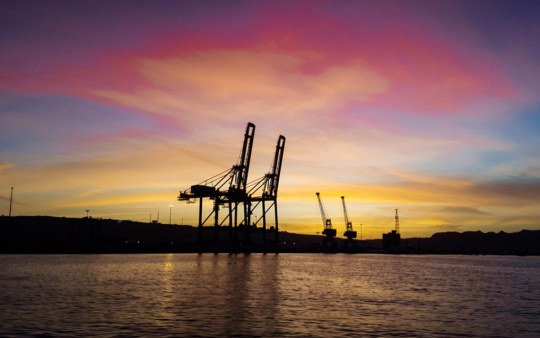
Properties to invest in the port city of Gwadar
There are various plot files up for sale in Gwadar. If you are looking to buy a 5 marla plot file in Gwadar, then keep a budget of PKR 2 lakh to PKR 8 lakh. 10 marla plot files are being sold at prices ranging from PKR 8 lakh to PKR 18.5 lakh. A 1 kanal plot file in Gwadar can be bought in the PKR 7 lakh to PKR 18 lakh range.
Commercial properties are also up for sale in Gwadar. So, if you are looking for a particular investment opportunity, then take a look at the plot prices of these commercial properties up on sale in Gwadar. Prices of commercial properties range from PKR 8 crore to PKR 3.5 billion.
So, these were some of the latest updates on Gwadar. For more information, keep reading My Blog, the best real estate blog in Pakistan. If you want to know more about Gwadar and how it became a tax-free-zone, check out our piece on the 23-year tax holiday in Gwadar. Don’t forget to write to me at [email protected] and I will surely get back to you.
Read the full article
0 notes